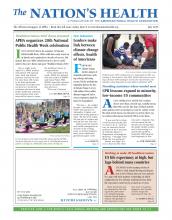Health advocates submitted details of their NPHW events to The Nation’s Health in April, an alphabetical summary of which follows.
With a theme of “Healthiest Nation 2030,” this year’s National Public Health Week, April 6-12, attracted the support and participation of communities nationwide and celebrated the 20th anniversary of the annual observance.
Hundreds of events offered residents information, tools and resources for improving their health and called on entire communities to join a growing movement to create the healthiest nation in one generation.
ALABAMA
The University of Alabama Department of Health Science in Tuscaloosa, Alabama, honored APHA President-elect Camara Jones, MD, PhD, MPH, as its 2015 National Public Health Week scholar. Jones addressed students and faculty on the topic of “Achieving Health Equity: Tools for Addressing Racism and Other Systems of Structured Inequity.” On the last day of NPHW, the campus’ Delta Xi chapter of Eta Sigma Gamma, a health education honorary society, hosted an event encouraging fellow health students to sign APHA’s pledge to get active in creating the healthiest nation in one generation. More than 50 students signed the pledge and received a sticker that read, “I will create a healthy me to create a healthy we.”

APHA President-elect Camara Jones gives a speech at the University of Alabama.

Members of Health Happens Here in Orange County, a teen youth forum, pledge to be health advocates and fight obesity.
ALASKA
In honor of National Public Health Week, the University of Alaska in Anchorage, Alaska, hosted a Spring Food Summit with a panel of food experts who discussed ways to integrate local, sustainable and healthy foods in campus activities. The MPH Program Student Advisory Council co-hosted a showing and discussion of the film, “The Anonymous People,” which chronicles the lives of Americans in substance abuse recovery. The university also hosted “No Matter the Weather” walks to promote physical activity, and the university’s Consortium Library offered a week-long public health information and book display.

A University of Alaska-Anchorage student shares information about eye health.
In addition, public health students organized and hosted a variety of NPHW events, such as heart-healthy and diabetic-specific food tastings, a healthy food fair and a briefing for military medical personnel on healthy snacks. Students partnered with the Alaska Literacy Program to develop lesson plans about nutrition and developing healthy recipes. The NPHW celebration made its way into the larger community as well. Public health students visited a local farmers market and street fair and encouraged residents to sign APHA’s Healthiest Nation pledge. They also set up informational displays about eye health at a local eye clinic, promoted HIV and sexually transmitted disease testing at a youth residential treatment program, promoted healthy eating and physical activity at a local clinic that cares for underserved residents, and posted information on prostate cancer screenings on Facebook.
Also in Anchorage, Mayor Dan Sullivan signed a proclamation in support of National Public Health Week that mentioned the Healthy Alaskans 2020 statewide initiative. Sullivan also hosted a Walk and Talk forum in which people discussed issues such as pedestrian safety, bike lanes, affordable housing and community redevelopment.
The Public Health Center in Dillingham, Alaska, partnered with the University of Alaska Fairbanks campus in Bristol Bay and the Bristol Bay Area Health Corporation to sponsor a heart health event in honor of National Public Health Week. The event, which featured information stations on healthy diets, exercise, heart disease, blood pressure screening, heart attack signs and decreasing heart disease risks, was aimed at residents who are not eligible to receive free services at the local tribal hospital.
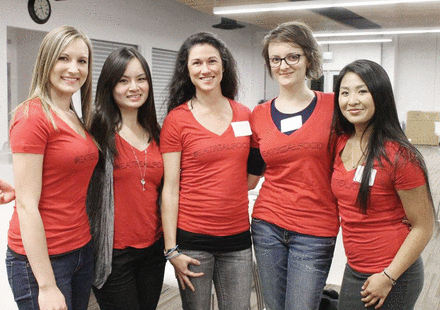
Loma Linda University students in Loma Linda, California, encourage healthy eating after screening the film “Fed Up.”
ARIZONA
At the University of Arizona in Tucson, Arizona, National Public Health Week activities kicked off with a poster forum featuring the work of students within the Mel and Enid Zuckerman College of Public Health as well as a keynote address from former U.S. Surgeon General and college alumnus Richard Carmona, MD, MPH. The event, which attracted more than 100 attendees, was designed to highlight students’ innovative and service-oriented research. Four cash awards were given to outstanding student poster presentations, such as research examining how families in a village in Kenya clean their bed nets and the association to rates of malaria.
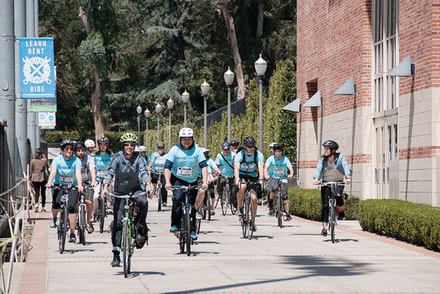
Cyclists ride in the annual Tour de UCLA at the University of California-Los Angeles.
CALIFORNIA
In Berkeley, California, the University of California-Berkeley Center for Public Health Practice partnered with Health Communication Matters, a collaborative of the APHA Community Health Planning and Policy Development Section and the Public Health Education and Health Promotion Section’s Health Communication Working Group, to produce a webinar on diabetes and obesity. More than 400 people registered for the 90-minute, interactive event, which was produced in observance of National Public Health Week. The webinar featured information about two programs that engage urban youth in developing their own narratives about impacting health in their communities. For example, the webinar educated viewers on an effort that helps youth use spoken word to express the impact of Type 2 diabetes on the people in their lives.
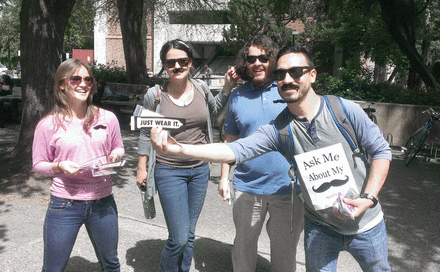
California State University-Chico nursing students use a mustache campaign to spread awareness about sexual health.
California State University photo courtesy Cassandra Miracle
Nursing students at California State University in Chico, California, used National Public Health Week to raise awareness about sexual health and growing rates of gonorrhea and chlamydia. Students organized a “mustache” campaign, posting fliers around campus that encouraged students to “Ask Me About My Mustache, April 6-10.” During NPHW, nursing students took shifts wearing mustaches, engaging with fellow students and handing out safe sex kits. To create the safe sex kits, students partnered with the Butte County Public Health agency, which provided more than 4,000 condoms as well as lubricants, educational brochures and screening information. Organizers also created small cards with a mustache on one side and community resources on the other. By the end of NPHW, students had distributed 1,000 safe sex kits.
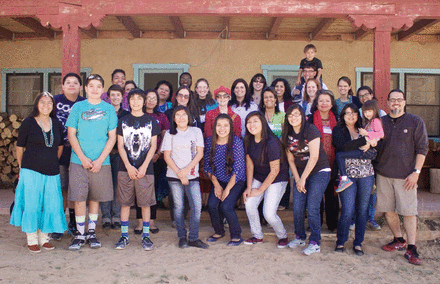
The Native Health Initiative in Albuquerque, New Mexico, hosts its annual Indigenous Health Leadership Institute.
New Mexico leadership institute photo courtesy Native Health Initiative
The University of California-San Diego’s Institute of Public Health in La Jolla, California, hosted its first Public Health Research Day in observation of National Public Health Week. Designed to highlight research by students and faculty, the event featured more than 88 abstracts on topics such as chronic disease, environmental health, health disparities, physical activity and diet and community health programs and policy. Prizes were awarded to the top posters. Following the poster presentations, students and faculty gathered for a panel discussion with four longtime practitioners on their personal journeys in the field of public health.
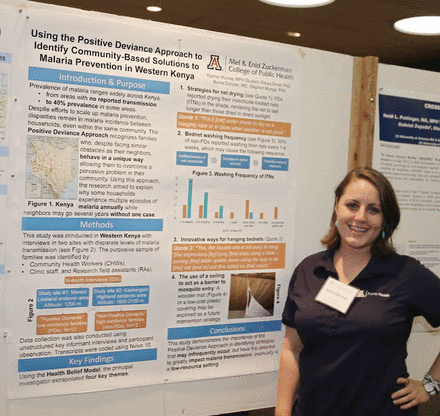
A University of Arizona student presents her poster at a forum.
University of Arizona photo courtesy Joni Dean
The Loma Linda University School of Public Health Student Association in Loma Linda, California, organized a variety of activities to celebrate National Public Health Week. The week began with a demonstration called “Raising the Grade,” in which participants explored health data. Tuesday featured a presentation about health differences between ZIP codes. On Wednesday, public health students set up a physical activity course, which included a rock wall, and conducted surveys of homeless youth in San Bernardino, California, in partnership with a local homelessness organization. On Thursday and in partnership with the Nutrition Council Student Association, the student association hosted a screening of the film “Fed Up” and a related panel discussion. On the last day of NPHW, the winners of the week’s This is Public Health sticker and photo competition were named.
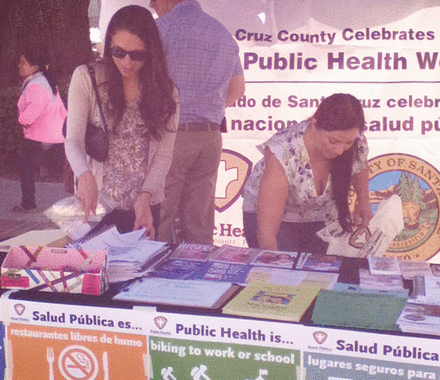
In Santa Cruz, California, residents pass out health resources.
In Los Angeles, California, Students of Color for Public Health at the University of California-Los Angeles Fielding School of Public Health organized events around the “Healthiest Nation 2030” theme in observance of National Public Health Week. The week began with a discussion on the intersections between labor and health as well as a workshop about microaggressions and health. During the workshop, participants discussed ways that students, faculty and staff can address microaggressions, which are forms of unintended discrimination, and help create a healthy environment for all students.
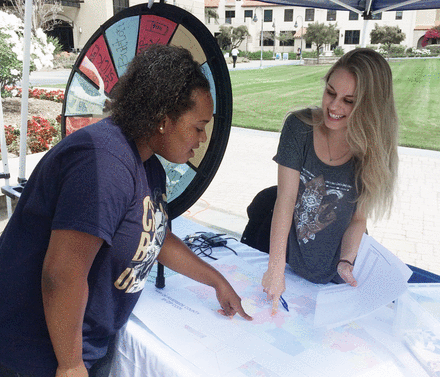
Students at California Baptist University in Riverside, California, discuss the connections between ZIP codes and health.
On Tuesday of NPHW, Students of Color for Public Health organized a health equity lecture featuring APHA member Beatriz Solis, PhD, MPH, director of community health at the California Endowment, as well as Tox It Out, an event about toxic substances and personal care products, during which attendees learned how to make their own products with natural ingredients. The week continued with the second annual Tour de UCLA, an interactive tour highlighting the campus’ bike-friendly design. Other NPHW activities included a trivia game to raise awareness about sexual and reproductive health, speed networking featuring undergraduate and graduate public health students and an event about the mental health effects of gentrification and displacement that featured remarks from a variety of community organizations.
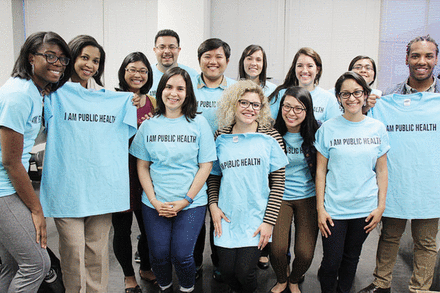
At the University of California-Los Angeles, Students of Color for Public Health wrap up a workshop on microaggressions.
Youth learned nutrition, physical activity and leadership skills during a National Public Health Week event in Orange, California. The Health Happens Here campaign of Orange County organized a variety of youth events at El Modena Family Resource Center. Young people learned how to make healthy snacks and meals at home, how to read nutrition labels on beverages and how to make fruit- and vegetable-infused water. After a self-defense demonstration, the participants discussed an ongoing photovoice project. The youth had been taking photos of their environments, and the NPHW event gave them an opportunity to discuss the images, talk about whether the images represented healthy environments and brainstorm solutions for creating healthier neighborhoods. Youth were also asked to create a letter or video to their future selves describing ways they hope to improve their health. The participants signed a pledge to make at least one healthy behavior change.
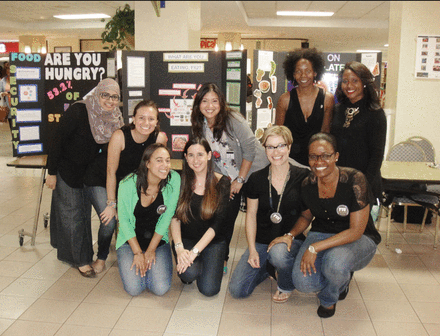
Florida International University students in Miami staff a table about food insecurity and finding healthy meals on campus.
In Riverside, California, the College of Allied Health at California Baptist University celebrated National Public Health Week with activities organized around the five daily NPHW themes. During the week, students used trivia games to test each other’s public health knowledge, offered healthy food samples, provided education on drought and emergency preparedness, organized visits with community health workers and discussed the intersections between ZIP codes and health. The week ended with a public health movie night featuring “Unnatural Causes: Is Inequality Making Us Sick?” and “Weight of the Nation.”
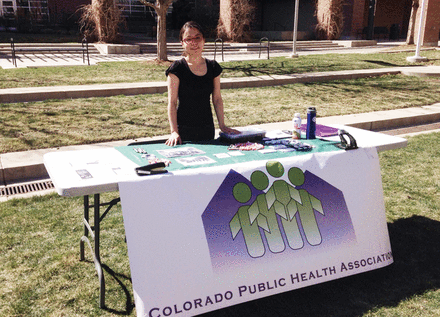
The Colorado Public Health Association’s student director gives out information about the APHA Affiliate in Denver.
In Palm Springs, California, the National Indian Health Board held a meeting with tribal leaders, federal partners, researchers and community-based service providers during National Public Health Week. The 6th Annual Tribal Public Health Summit, which was held April 7-9, focused on building skills of the tribal public health workforce. The summit’s 54 sessions addressed issues such as workers safety, oral health accreditation and tobacco. Other highlights included a daylong training on the Affordable Care Act, a diabetes poster session and a fitness event.
The School of Nursing and Health Professions at the University of San Francisco in San Francisco, California, hosted a variety of webinars in observance of National Public Health Week. The first webinar focused on environmental health and, in particular, on the environmental damages related to fracking. The second webinar educated viewers on the drive to eradicate Guinea worm, which is transmitted through contaminated water, in the developing world. The webinar highlighted community-based and UNICEF-led eradication efforts. The last webinar introduced viewers to Politics, Economics, Epidemiology and Medicine, Ethics and Law, a framework that can be used to integrate different perspectives and principles in the advancement of public health policy.
In Santa Cruz, California, the Santa Cruz County Health Services Agency kicked off National Public Health Week with an editorial published in the Santa Cruz County Sentinel, “National Public Health Week: You Are the Public in Public Health.” Many of the agency’s NPHW activities centered around raising awareness of the role of public health in people’s everyday lives. Organizers produced six different posters in English and Spanish that began with the text “Public Health Is…” and went on to celebrate public health achievements and activities such as smoke-free restaurants, vaccinations and biking to work. More than 300 posters were distributed to local schools, businesses, restaurants, medical providers and other organizations. Other NPHW events in Santa Cruz included a table at the local farmers market that offered health education and screening services, free blood glucose and blood pressure screenings at a local clinic, an open house at the agency’s Medical Therapy Unit and a training workshop on engaging youth in environmental health.
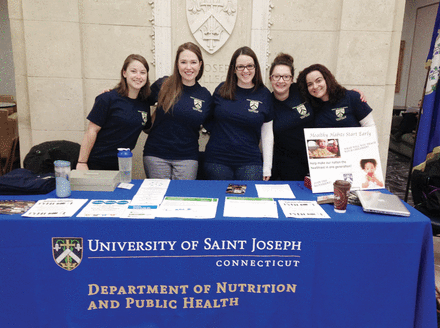
Students at the University of Saint Joseph in West Hartford, Connecticut, share public health information.
Banning nuclear weapons was the focus of a National Public Health Week event in Santa Monica, California. Physicians for Social Responsibility-Los Angeles and the International Health and Epidemiology Research Center hosted a Global Wave Goodbye to Nuclear Weapons event at a local sculpture, “Chain Reaction,” which depicts a nuclear mushroom cloud. The event was part of a series of worldwide events taking place prior to the 2015 Review Conference of the Parties to the Treaty on the Non-Proliferation of Nuclear Weapons. Photos and video from the global demonstrations were presented to leaders at the conference.
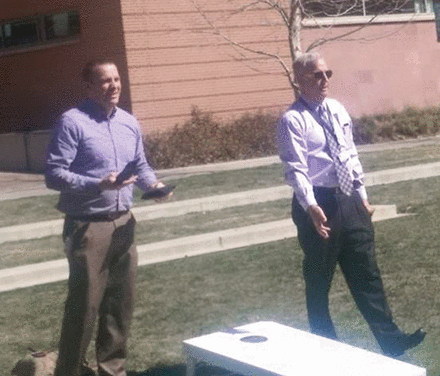
Participants in the Colorado School of Public Health’s National Public Health Week play cornhole in Denver.
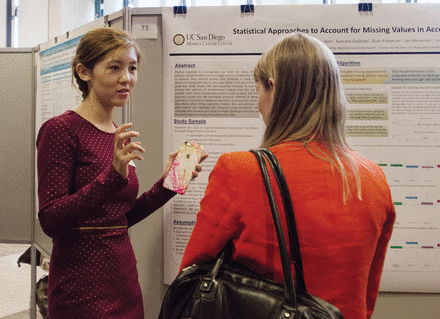
A University of California-San Diego student presents her research on a poster during a Public Health Research Day.
COLORADO
National Public Health Week kicked off with a party at the University of Colorado School of Public Health in Aurora, Colorado. The school’s National Public Health Week Committee organized the event to generate interest in NPHW and build connections with local partners. The event featured the Colorado Society for Public Health Education, Colorado Public Health Association, the student-run Dawn Clinic, Delta Dental, the Anschutz Medical Campus Health and Wellness Center and the student community group Bridging Research and Aurora Neighborhoods for Community Health. During the event, which offered healthy snacks and volleyball, organizations answered questions and explained how public health fits into their missions.
Boulder County Public Health in Boulder, Colorado, observed National Public Health Week with its annual Healthy Community Awards celebration, which recognized three community partners for their work in improving residents’ health. This year’s winners were the Boulder County Farmers Markets, which run a program that allows Supplemental Nutrition Assistance Program beneficiaries to purchase locally grown, healthy produce; Community Food Share, a local food bank that distributes more than 8 million meals annually; and 9Health Fair, which provides free medical screenings and evaluations.
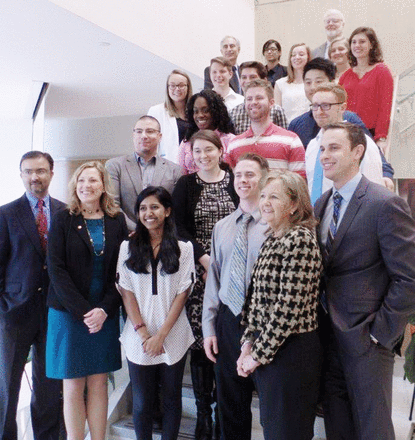
Attendees enjoy one of the many NPHW events in Delaware.
The Colorado Public Health Association in Denver, Colorado, organized screenings and discussions of the film “The Raising of America” across the state and in honor of National Public Health Week. The film explores the value of early childhood education and care as contributors to good health, academic success and lifelong success. The screenings, which the association organized in partnership with the Colorado Society for Public Health Education, the Public Health Nurses Association of Colorado, the Colorado Environmental Health Association and the Colorado School of Public Health, took place in the cities of Fort Collins and Durango and at the Colorado Department of Public Health and Environment in Denver. In addition to the film showings, the APHA-affiliated association also organized an outing to help clean up Denver’s Cherry Creek Trail.
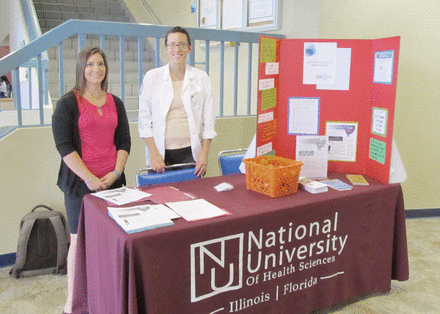
Chiropractic students at the National University of Health Sciences in Pinellas Park, Florida, offer healthy snacks.
National University of Health Sciences photo courtesy Heather Hastings
Jefferson County Public Health in Lakewood, Colorado, celebrated National Public Health Week by honoring its 2014 public health champions of the year. During an awards ceremony, a number of local residents and policymakers were awarded for promoting healthy eating and active living, promoting health and wellness in local schools, emergency preparedness planning, reducing the toll of tobacco and promoting safe drinking water. Also as part of NPHW, Jefferson County Public Health released its 2014 annual report, “Covered?: We’ve Got You Covered,” which details the year’s public health accomplishments and was distributed to more than 65,000 homes and businesses.
CONNECTICUT
In Hartford, Connecticut, the Connecticut Public Health Association’s Mentoring Organization Registry celebrated National Public Health Week with an outreach project aimed at exposing high school students to the field of public health. Using a PowerPoint presentation that highlighted key topics in public health, volunteer public health practitioners and public health students gave presentations in high schools and community colleges across the state, reaching more than 2,100 high school and community college students from more than 25 communities. In an evaluation of the outreach project, a majority of students said the presentation introduced them to ways to improve the health of their communities. In addition, half of students surveyed said they want to hear more about public health or would volunteer in public health activities.
FLORIDA
Master of Public Health students at the University of Florida in Gainesville, Florida, took part in a Public Health Day to showcase their internship work and celebrate National Public Health Week. The College of Public Health and Health Professions hosted a number of activities and guest lectures throughout the week.
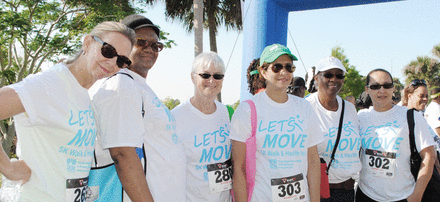
Orlando, Florida, residents gear up for a 5K walk held by the Florida Department of Health in Orange County.
Also at the University of Florida, a program known as HealthStreet, which engages local residents in opportunities to take part in relevant research in an effort to reduce health and research disparities, hosted its first national forum, “Our Community, Our Health.” The forum brought together participants from the National Institutes of Health’s Clinical and Translational Science Award institutions to discuss studies and future research. Many forum attendees participated through text messaging and presentations that were streamed live.
Health promotion and disease prevention students from the Robert Stempel College of Public Health and Social Work at Florida International University in Miami, Florida, used National Public Health Week to raise awareness about food insecurity. Students organized an Are You Hungry? event on campus to educate fellow students about hunger and healthy eating. More than 70 students took part, taking pre- and post-education surveys to gauge their knowledge of food insecurity, available resources and where to find healthy eating options on campus. Participants were also offered a healthy snack and the recipe for making the snack on their own.
Also at Florida International University, Student Health Services organized a week full of NPHW activities. Daily themes focused on topics such as physical activity, sexual health and mental health. To highlight the NPHW theme of “Healthiest Nation 2030,” a PhD student within the Department of Health Promotion and Disease Prevention gave a presentation on human papillomavirus, offering the audience basic information on risk factors and vaccination recommendations and included information geared toward the lesbian, gay, bisexual and transgender community.
The NPHW theme of “Healthiest Nation 2030” inspired other events at the university. The Stempel Public Health Association and Student Health Services collaborated to host an NPHW event on mental health, offering students information on mental health resources, statistics on stress and depression, and the types of foods that support cognitive health. An outdoor event titled “Train. Sweat. Repeat.” hosted exercise demonstrations. A day later, dietitians offered students information on healthy eating and portion sizes. They also conducted cooking demonstrations and gave out samples of healthy snacks.
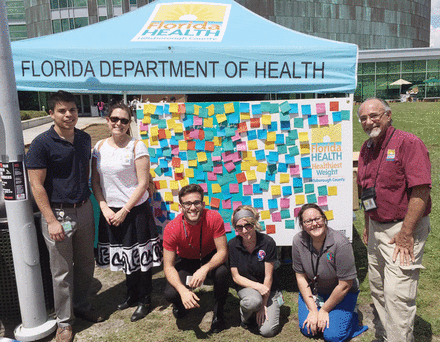
The Florida Department of Health in Hillsborough County encourages Tampa, Florida, residents to adopt healthy habits.
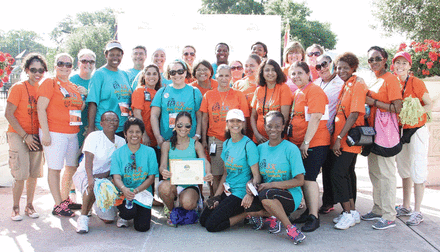
A 5K and health expo led by the Florida Department of Health in Seminole County engages Sanford, Florida, residents.
Near the end of NPHW, students hosted an event on sexual health, HIV/AIDS and the prevention of HPV. On the last day of NPHW, Student Health Services hosted a presentation on healthy relationships, featuring a panel discussion and remarks from a survivor of an abusive relationship. Also during NPHW, the university partnered with the nonprofit organization Hope Through Healing Hands to host a Global Health Forum, which featured representatives from the Bill and Melinda Gates Foundation and the W.K. Kellogg Foundation.
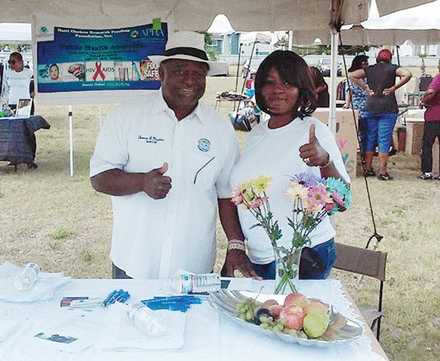
The Haiti Cholera Research Funding Foundation raises awareness about chronic disease in Riviera Beach, Florida.
The Florida Department of Health in Orange County in Orlando, Florida, kicked off National Public Health Week with its ninth annual Let’s Move 5K Walk and Health Fair. The free event supported the Florida surgeon general’s Healthiest Weight Florida initiative and welcomed residents to learn more about the role of public health in the community. In addition to organizing walks, the health fair offered free health screenings, health information, healthy snacks and kids activities. NPHW was also a time to honor community leaders and staff during the agency’s Public Health Heroes ceremony.
In Pinellas Park, Florida, during National Public Health Week, the National University of Health Sciences in partnership with St. Petersburg College hosted a forum on the NPHW theme of “Healthiest Nation 2030.” More than 50 people came to hear chiropractic students present a roadmap for becoming the healthiest nation that focused on three areas: exercise, health education in elementary school and access to care. Attendees also heard from faculty members, who talked about the economic burden of preventable injuries and how public health professionals can model safe behaviors. The event also encouraged audience members to participate in a Zumba exercise and chair yoga.
The university’s chapter of the Student American Chiropractic Association distributed fliers on the global burden of spine pain. Using social media, they encouraged their peers to sign APHA’s pledge to help create the healthiest nation in one generation. Students and faculty also wore a NPHW badge during the week and distributed 150 NPHW brochures.
During National Public Health Week, the Haiti Cholera Research Funding Foundation visited a flea market in Riviera Beach, Florida, to raise awareness about HIV/AIDS, stroke, autism and food safety. The organization made particular efforts to reach Haitian, black and Hispanic residents with information on HIV prevention, the signs of autism, how to prevent food contamination, and healthy eating and lifestyle tips.
The Florida Department of Health in Seminole County in Sanford, Florida, celebrated National Public Health Week with a variety of events, including HIV and sexually transmitted disease screenings, a community-wide health expo and educational seminars open to the public. The health department hosted nine showings of the documentary “The Raising of America,” which examines the importance of early childhood development. In partnership with the local Healthy Start Coalition, public health workers hosted a free baby shower for new fathers, mothers and soon-to-be parents that featured guest speakers, healthy food and giveaways. The health department also set up a hyperthermia display to illustrate how quickly temperatures can rise inside a closed vehicle and offered tips on protecting children from dangerous heat. Health workers also offered drowning prevention information and hosted a blood donation drive, where donors could also receive a wellness checkup.
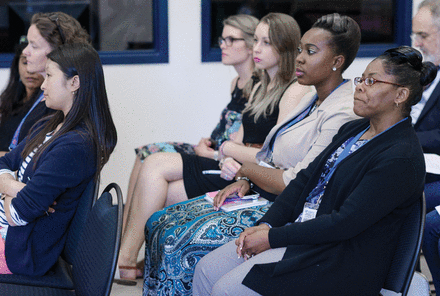
Attendees of a forum on health disparities in underserved communities listen to a presentation at the University of Florida.
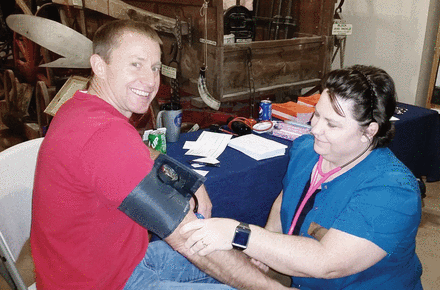
Harrison County Home and Public Health provides a free blood pressure screening at a health fair in Logan, Iowa.
Harrison County photo courtesy Nikki Davis
Within the Seminole County health department, staff launched a “Health Starts With…” campaign, which highlighted the foundational role of public health in people’s lives. Staff also participated in a statewide campaign to keep Florida clean by picking up trash outside the health department building. The department’s Healthy Start program took NPHW as an opportunity to raise awareness of child abuse prevention. The week ended with the department’s first Live, Work, Move Seminole 5K and Health and Fitness Expo in downtown Sanford, which attracted more than 100 spectators and vendors as well as more than 250 race participants. Along with the events, the city manager presented a proclamation to celebrate “Live, Work, Move Seminole Day.”
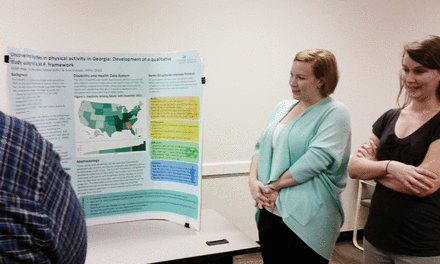
Georgia State University students in Atlanta present at Chronic Disease Day.
In Tampa, Florida, the Florida Department of Health in Hillsborough County promoted its I Promise Florida campaign during National Public Health Week. The campaign encourages residents to promise to fulfill a variety of healthy habits, such as eating more fruits and vegetables, avoiding tobacco, breastfeeding babies, and getting screened for HIV and other sexually transmitted diseases. By the end of NPHW, health staff had surpassed their goal of having 1,000 residents make a healthier lifestyle promise. The health department’s 400 staff members made their own promises as well. Health staff promoted the campaign at a variety of venues, including a local outdoor market and a health fair. In addition to the promise campaign, health workers also gave out nutrition information and promoted the Women, Infants and Children’s Program at a milk drive hosted by the Mother’s Milk Bank of Florida.
More than 3,500 students and faculty from the University of South Florida College of Public Health in Tampa, Florida, took part in a variety of National Public Health Week events, including an event recognizing more than 150 community partners and agencies. Students and faculty also participated in a Keep Tampa Bay Beautiful Trash Free Waters Initiative, a mobile food pantry distribution and an American Heart Association National Walking Day event, and taught parents and children about water safety at a summer fair at the Tampa Bay History Center. More than 200 students, faculty and staff took part in the College of Public Health’s Give Life Day, donating blood, learning CPR skills and signing up for the National Marrow Donor Program registry.
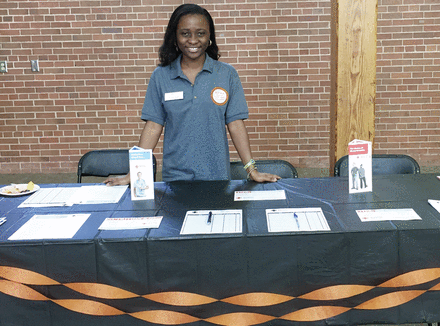
A Mercer University public health student offers health and wellness resources during National Public Health Week.
To celebrate World Health Day on April 7, graduate students set up displays on foodborne and vectorborne disease and hosted laboratory tours. Students hosted This is Public Health displays on campus and brought health education to more than 1,000 young people at the Benito Middle School Health Expo. Hundreds of students and faculty visited interactive displays on campus about safe walking, bicycling and driving, and 100 people were fitted with bike helmets. Students also volunteered at a Special Olympics event, a breast milk drive and a number of community health fairs. The college’s Public Health Awards Ceremony also took place during NPHW to recognize students, faculty, alumni and community partners for their accomplishments.
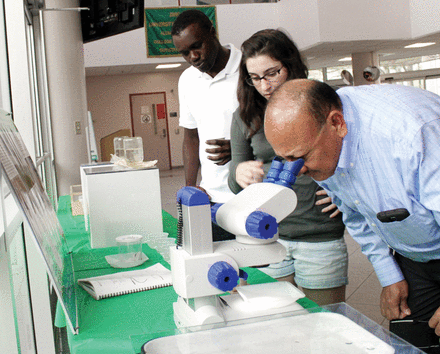
University of South Florida graduate students set up displays on foodborne and vectorborne disease in Tampa, Florida.
University of South Florida photo courtesy Ellen Kent
GEORGIA
In observance of National Public Health Week, the Association for Chronic Disease Awareness, a student chapter of the National Association of Chronic Disease Directors at Georgia State University in Atlanta, Georgia, held a Chronic Disease Day that included a poster competition and career panel. The career panel, which talked about addressing chronic disease through an interdisciplinary framework, included Ashleigh May, PhD, MS, an epidemiologist with the Centers for Disease Control and Prevention’s Division of Nutrition, Physical Activity and Obesity.
The Mercer Public Health Association of Mercer University held National Public Health Week events on its campuses in Atlanta, and Macon, Georgia. In Macon, the association hosted a Hands in for Health health and wellness fair, which offered students information about local farms that deliver health foods at affordable prices. On the Atlanta campus, students hosted a “Raising the Grade” table, where students could pick up information on the nation’s health and how they could help create a healthier nation. On both campuses, students were encouraged to sign APHA’s pledge to help create a healthier nation. The association also hosted a Public Health Celebration, during which students could participate in field day games and learn about Mercer University’s public health undergraduate and graduate programs.
HAWAII
In Honolulu, Hawaii, the Hawaii Public Health Association observed National Public Health Week with presentations from four local public health and health care professionals, who spoke on topics such as Hawaii’s public health history, electronic cigarettes and public policy and community partnerships to address obesity and diabetes. Among the speakers were Virginia Pressler, MD, MBA, FACS, executive vice president and chief strategic officer for Hawaii Pacific Health, and APHA member Gerald Ohta, affirmative action officer at the Hawaii State Department of Health. More than 130 public health professionals and students attended the event, which took place at the University of Hawaii Cancer Center.
ILLINOIS
All three Stickney Public Health District sites in Burbank, Chicago and Stickney, Illinois, used National Public Health Week to kick off new walking clubs, which are designed to encourage local residents to stay active and meet their neighbors. Walking groups set off from all three health district sites as well as a local senior center and are open to walkers of all levels and ages.
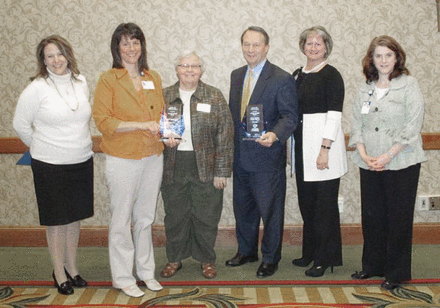
St. Luke’s Hospital of Cedar Rapids, Iowa, receives an award from Linn County Public Health and its Board of Health.
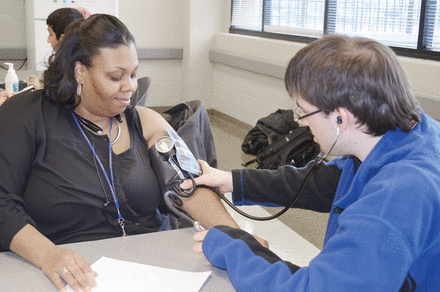
A woman receives a free blood pressure screening during a National Public Health Week event held by Chicago Lighthouse.
Chicago Lighthouse photo courtesy Dominic Calabrese
The Society for Obesity Awareness and Prevention, a student group at the University of Illinois School of Public Health in Chicago, Illinois, hosted a week-long Stairway to Health Scavenger Hunt to celebrate National Public Health Week. To take part in the scavenger hunt, which was located in the main stairwell of the School of Public Health, participants had to climb 11 flights to find clues to a set of questions. Students who submitted answers were entered in a raffle for prizes such as massage certificates or a Fitbit electronic fitness tracker.
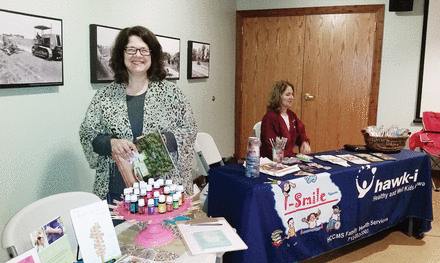
Local groups run booths at the Live Healthy Harrison County Health Fair in Logan, Iowa.
In Chicago, Illinois, Chicago Lighthouse, a nonprofit group serving people who are blind or visually impaired, celebrated National Public Health Week with the theme, “Personal Health, Your Greatest Wealth.” Activities during the week included health screenings, group dances, exercise sessions, lectures, a community walk and a healthy lunch as well as a weight loss competition.
At Benedictine University in Lisle, Illinois, the Student Advisory Panel of the Master of Public Health Program offered most of its National Public Health Week activities online. Every morning of the week, a summary about that day’s NPHW theme, including relevant information from the Centers for Disease Control and Prevention, was posted to the MPH students’ Facebook page. Organizers also posted infographics, conducted online surveys, linked to resources and APHA events, and hosted online discussions. For example, in observance of the NPHW daily theme of “Building on 20 Years of Success,” students posted to Facebook about the greatest public health achievements of the 20th century. In addition to online activities, students also set up a table on campus that featured a map of Illinois counties. Visitors were asked to place a pushpin in the county where they lived and were then provided with information on that county’s health rankings and statistics as well as a list of area health resources.
IOWA
In Cedar Rapids, Iowa, Linn County Public Health and the Linn County Board of Health hosted a reception in honor of National Public Heath Week. More than 100 public health professionals and community partners attended the reception, where four awards were given in recognition of an individual’s or organization’s contributions to public health. The event’s keynote speaker was APHA member Judith Monroe, MD, deputy director of the Centers for Disease Control and Prevention and director of the agency’s Office for State, Tribal, Local and Territorial Support. During her presentation, Monroe congratulated Linn County Public Health for receiving accreditation from the Public Health Accreditation Board. The agency is the first in Iowa to achieve accreditation.
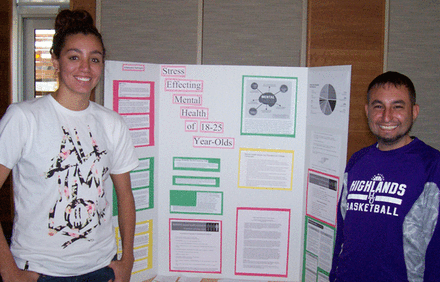
A student health poster showcase was held during NPHW by New Mexico Highlands University in Las Vegas, New Mexico.
New Mexico Highlands University photo courtesy Ruthy Watson
In observance of National Public Health Week, the University of Iowa College of Public Health in Iowa City, Iowa, hosted Research Week to celebrate the diversity of public health research and recognize its role in improving people’s health. The event’s keynote speaker was Howard Koh, MD, MPH, former assistant secretary for health at the U.S. Department of Health and Human Services, who is now a professor in the Department of Health Policy and Management at Harvard School of Public Health. Other NPHW events included a communications workshop and poster contest.
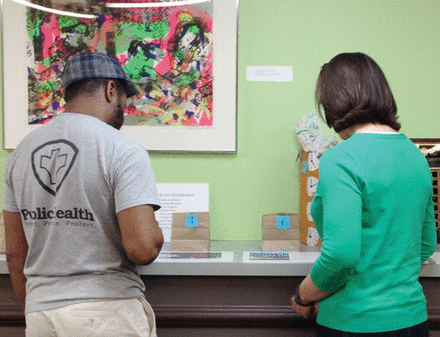
University of Louisville School of Public Health and Information Sciences pick winners of a public health photo contest.
Harrison County Home and Public Health in Logan, Iowa, celebrated National Public Health Week with a Live Healthy Harrison County Health Fair. In partnership with community organizations such as the Harrison County Emergency Management Agency and a local farmers market, the health fair offered a variety of information and services, such as skin cancer screenings, blood pressure checks, healthy recipes and dental checks. Health officials even walked attendees through a mock chemical emergency. The Missouri Valley Fire Department was on hand with a fire truck and ambulance and let visitors try on firefighters’ protective clothing and walk inside the emergency vehicles. Health fair attendees were also encouraged to complete a community health improvement plan questionnaire and take advantage of nearby walking trails, at the end of which walkers could get raffle tickets and win prizes.
KENTUCKY
The Lexington-Fayette County Health Department in Lexington, Kentucky, used National Public Health Week to raise awareness about child abuse. In partnership with Prevent Child Abuse Kentucky, health staff planted pinwheels in front of the health department building to remember those who have been harmed by childhood abuse and to pledge to continue educating residents on ways to prevent child abuse. More than two dozen staff planted more than 100 pinwheels, which attracted the attention of two local TV stations.
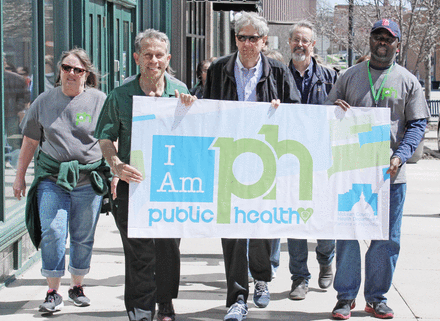
McLean County Health Department in Bloomington, Illinois, holds a walk led by the staff and local elected officials.
A photo contest was at the center of National Public Health Week activities at the University of Louisville School of Public Health and Information Sciences in Louisville, Kentucky. During NPHW, students, faculty and staff selected winners of a public health photo contest in which participants were asked to create images and captions that illustrate the role of public health in the community, including the impact of the social determinants of health. Prize-winning photos included a picture of a newborn’s feet with a caption about breastfeeding; an image of a vacant home with a caption about neighborhood crime; and an image of a protest with a caption about social justice. All the photos were on display in the School of Public Health and Information Sciences building.
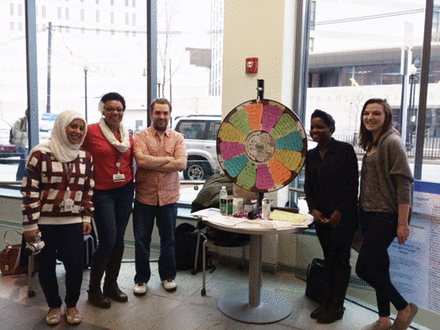
MCPHS University students volunteer at the Boston school’s annual Wellness Fair.
LOUISIANA
A team of community health workers at Tulane University School of Public Health and Tropical Medicine in New Orleans, Louisiana, organized events to coincide with each of National Public Health Week’s daily themes. On Monday and with the help of local organizations, workers hosted Nutrition with a Twist, an event in Gretna, Louisiana, that educated attendees on wellness, nutrition and exercise with interactive games and resources. Tuesday focused on a ribbon-cutting ceremony at the United Houma Nation Wellness Center, which was open to all tribal members and offered a variety of health and education services. On Wednesday, organizers hosted a wellness event at New Orleans’ Manifested Miracles, a program to help women maintain sobriety. On Thursday, they held an educational event at Plaquemines Medical Center in Port Sulphur, Louisiana, about women’s health and cardiovascular disease. And on the last day of NPHW, organizers held a breast and cervical cancer awareness and educational presentation for staff at Healthy Start New Orleans, which provides services to soon-to-be and new parents.
MAINE
In Lewiston, Maine, the New Mainers Public Health Initiative, a group that reaches out to new immigrants and refugees, held a forum in observance of National Public Health Week. During the event, participants discussed issues such as tuberculosis and hepatitis B as well as strategies to improve community health. The forum provided a safe space for community members and stakeholders to gather and discuss solutions. Also during NPHW, initiative workers put up posters about hand-washing and handed out hand sanitizer to people downtown.
MARYLAND
In Baltimore, Maryland, the University of Maryland School of Medicine’s Master of Public Health Program held a variety of National Public Health Week events. To kick off the week, students and staff took photos holding up signs that read “Becoming the Healthiest Nation in One Generation Starts With You” and used props such as jump ropes, hand weights and healthy snacks. Participants were also encouraged to upload their healthy selfies to social media. Public health students also joined a local walking club on a walk through a park, hosted a breakfast at the Ronald McDonald House Charities of Baltimore, and helped with a community health fair in southwest Baltimore. Students set up a booth on campus and encouraged fellow students to sign APHA’s pledge to help create the healthiest nation in one generation and gave out T-shirts and healthy snacks. Students ended NPHW with a scavenger hunt in which participants had to find the top 10 public health accomplishments.
Students in the Health Administration and Policy Program at the University of Maryland-Baltimore County in Baltimore, Maryland, celebrated National Public Health Week with tabletop displays at the local Port Discovery Children’s Museum. The interactive displays were designed for children ages 2 to 10. For example, the physical activity table had a demonstration of the benefits of yoga.
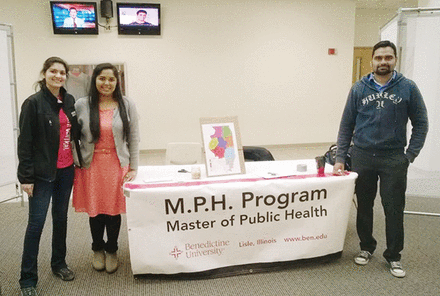
Benedictine University students in Lisle, Illinois, provide county-level health data for the state.
At the University of Maryland School of Public Health in College Park, Maryland, National Public Health Week marked the third annual Public Health Research@Maryland day, which attracted more than 550 attendees. The event’s theme was “Changing Climate and Health,” which focused on how climate change and health reform are impacting public health. Two keynotes and four panel sessions highlighted issues such as extreme weather events, maternal and child health, and the impact of marijuana on academic achievement. A poster competition attracted 128 posters from more than a dozen universities, and 13 students were awarded for their outstanding presentations. Among the event’s keynote speakers was APHA Executive Director Georges Benjamin, MD, who spoke on “Becoming the Healthiest Nation: A Public Health Approach.”
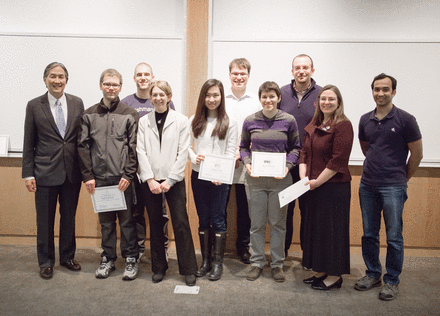
Howard Koh, left, former U.S. assistant secretary for health, attends the University of Iowa College of Public Health’s Research Week to celebrate National Public Health Week.
In North Bethesda, Maryland, JBS International and Georgetown University’s National Technical Assistance Center for Children’s Mental Health organized an April 7 Twitter chat to discuss trauma and its public health impact during National Public Health Week. With a hashtag of #TraumaTalk, the chat’s goal was to highlight the importance of trauma-informed care and equip public health practitioners with resources. During the Twitter chat, both organizations shared a Web-based trauma-informed care tool. A transcript of the Twitter chat is at bit.ly/traumatalk.
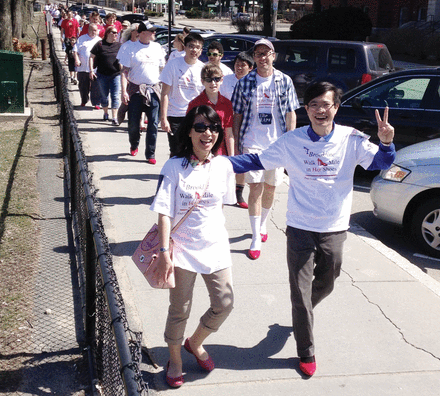
The Department of Public Health in Brookline, Massachusetts, holds a walk to raise awareness of sexual violence.
MASSACHUSETTS
In observance of National Public Health Week, the Amherst College Public Health Collaborative in Amherst, Massachusetts, hosted a dinner talk with Sonja Swanson, ScM, a research fellow at Harvard School of Public Health who specializes in eating disorders. The collaborative also hosted a soap-making event to raise awareness about hand-washing and hygiene, during which participants made their own soaps. To close out the week, the collaborative organized a hand-printing project that asked students to pledge to help any friend or peer dealing with mental distress by dipping their hands in paint and stamping their hands onto a NPHW banner.
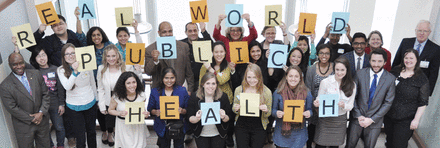
Participants in a symposium sponsored by Massachusetts’ Cambridge Public Health Department celebrate NPHW.
Cambridge, Massachusetts, photo courtesy Suzy Feinberg
In Boston, Massachusetts, students from the School of Arts and Sciences’ Peer Health Education course at MCPHS University, formerly known as Massachusetts College of Pharmacy and Health Sciences, observed National Public Health Week by volunteering at the campus’ annual Wellness Fair. Volunteers tapped sleep hygiene as their theme and engaged fellow students and community members in various health promotion activities, such as a game about optimal sleep environments and recipes for nighttime smoothies. They also handed out information on healthy sleep resources and caffeine-free teabags. Also during NPHW, the university’s Bachelor of Science in Public Health Program sponsored a panel discussion on pursuing graduate-level public health education. The panel featured student speakers who had been accepted into graduate public health programs, many of whom discussed strategies for seeking mentorship opportunities and applying to graduate programs.
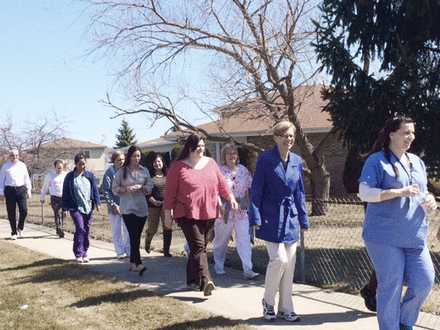
Stickney Public Health District sites across Illinois launch walking clubs to celebrate National Public Health Week.
The Department of Public Health in Brookline, Massachusetts, celebrated National Public Health Week with events highlighting a wide variety of topics, ranging from dental care to sexual assault. The health agency hosted a discussion on end-of-life decision-making, organized a training for volunteer emergency responders about providing psychological support in an emergency, and invited local parents to a discussion about teen sexuality and sexual behavior. People of all ages were welcomed to a workshop to learn how to preserve foods, with many participants leaving with pint jars of fermenting cabbage and pickled vegetables. A local dental group offered free fillings, extractions and cleanings to residents ages 18 and older who did not have access to dental care, helping more than 70 people.
The Brookline health department also organized a rabies vaccination clinic as well as a health fair featuring 20 local health, wellness and meditation practitioners. In an event called Walk a Mile In Her Shoes, more than 75 men and boys donned high heels and walked one mile with their families to raise awareness about sexual violence and to commit to ending such violence. The health department also hosted talks about sustainable diets and the importance of good communication between doctors and patients.
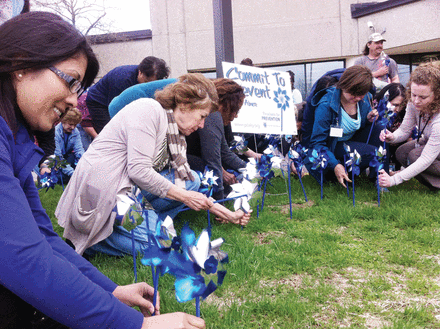
The Lexington-Fayette County Health Department in Lexington, Kentucky, plants pinwheels to honor child abuse victims.
The Cambridge Public Health Department in Cambridge, Massachusetts, celebrated National Public Health Week with its 12th annual symposium for public health graduate students and a poster gallery at Cambridge City Hall about the health agency’s efforts to gain accreditation. The Real World Public Health Symposium attracted 50 students from local schools of public health, who participated in interactive workshops, a career panel and a networking lunch. The symposium featured remarks from local public health practitioners, law enforcement staff and state health officials and covered topics such as tobacco control, addiction and caring for underserved populations.
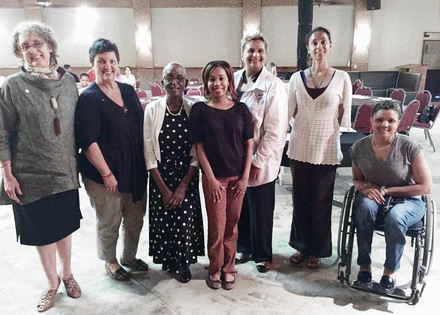
Tulane University School of Public Health and Tropical Medicine held a wellness event in New Orleans during NPHW.
In Chestnut Hill, Massachusetts, Boston College celebrated National Public Health Week with a series of speakers, films and events. During one of the events, “Place Matters: Explore U.S. Health Disparities Using Maps,” participants used iPads to identify the average life expectancy of their residential counties and placed a sticker on the map that was color coded according to poverty levels. The exercise was designed to explore the intersections between poverty and health.
The Public Health Museum in Tewksbury, Massachusetts, celebrated National Public Health Week with three events and free museum tours. In partnership with the Massachusetts Association of Occupational Health Nurses, the museum co-hosted a presentation on “Emergency Preparedness and the Nurses’ Role.” The museum set up a booth at the Tewksbury Health and Wellness Fair and spoke with visitors about public health. It also hosted an Educator’s Day, which featured an open house for high school educators and the opportunity to learn about the museum’s Outbreak program for high school students. The program introduces students to the history and importance of public health, the field of epidemiology, careers in public health and lets students investigate a simulated disease outbreak. The museum also extended its visiting hours during NPHW.
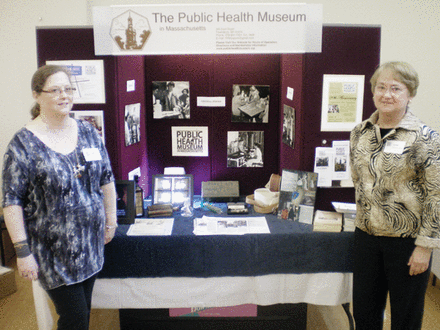
Staff of the Public Health Museum in Tewksbury, Massachusetts, set up a booth at the town’s health and wellness fair.
MICHIGAN
Public health students in Allendale, Michigan, at Grand Valley State University educated their community on how to help become the healthiest nation by 2030 during National Public Health Week. In addition to using social media to spread the word, students used the game Jenga to grab people’s attention. During the Jenga game, participants were asked to pull out a Jenga block and write what public health means to them on it. Answers ranged from healthy eating to breastfeeding, and all participants received prizes and educational information.
In Detroit, Michigan, National Public Health Week organizers at Wayne County Community College distributed a public health assessment survey titled “Healthiest Nation 2030” to nearly 50 students enrolled in human anatomy and physiology courses. The survey asked students if they believed negative social determinants, such as lack of social supports and bullying, were associated with academic attainments and quality of health. A majority of survey participants recognized that negative social determinants impact educational and healthy living opportunities. The survey exercise helped students visualize their future roles in improving community health.
The Macomb County Health Department in Mt. Clemens, Michigan, focused its National Public Health Week activities on the daily theme of “Building Broader Connections,” partnering with fellow public officials and a local grocery store to promote its Eat Well, Be Well program. During NPHW, health agency staff and grocery workers offered nutritious cooking demonstrations, healthy samples and smoothie tastings. Store visitors could also enter their favorite recipes in a contest for a chance to win gift certificates to the grocery stores. Health staff promoted the event through local media. Health staff also partnered with a variety of fellow agencies, health care providers and businesses to offer free child car seat inspections in the parking lot of an area store. In total, 41 car seats were inspected, of which 67 percent had been improperly installed.
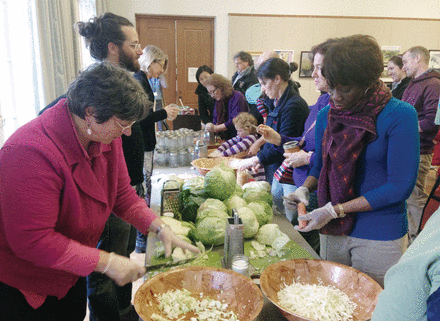
Brookline, Massachusetts, residents learn how to preserve fruits and vegetables at a local Department of Public Health event.
MINNESOTA
In Northfield, Minnesota, students participating in a public health study program at Carleton College put together an exhibit for National Public Health Week, “This is Public Health: Public Health in Practice.” The organizing students, who had spent months studying public health practice and traveling to Minneapolis, St. Paul and Washington, D.C., designed the exhibit to educate fellow students, staff and faculty on the breadth of public health work and to raise awareness of public health careers. The exhibit featured infographic-style posters on the social determinants of health and information on the social-ecological model, working with the community, art and healing, mental health and food access. The NPHW exhibit also offered a discussion on viewing violence through a public health lens.
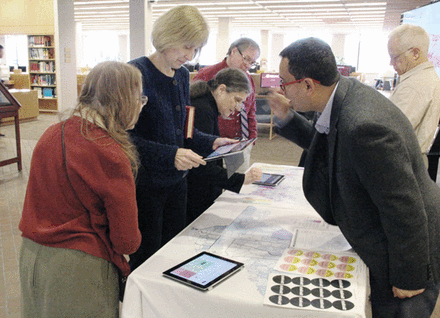
Participants in Boston College’s National Public Health Week use iPads to find the average life expectancy in their county.
Boston College photo courtesy Kevin Tringale
MISSISSIPPI
Students from the Mississippi University for Women’s Department of Health and Kinesiology in Columbus, Mississippi, celebrated National Public Health Week with a week full of events organized around the NPHW theme of “Healthiest Nation 2030.” Activities included a table set up in a student cafeteria that offered information on healthy sexual behavior and preventing sexually transmitted diseases. Visitors could also pick up free condoms and cookies shaped like genitalia. The student-run W Health Organization organized a panel of students who discussed how their majors tie into public health and what students can do with a public health degree.
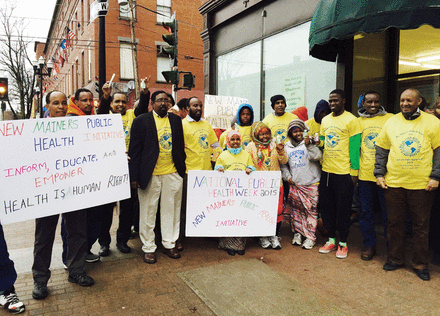
Members of New Mainers Public Health Initiative, which does outreach to immigrants and refugees, put up posters on hand-washing and give out hand sanitizer in Lewiston, Maine.
On Wednesday of NPHW, the student health organization set up a table in the cafeteria lobby with information on heart health and ways to prevent cardiovascular disease. Thursday offered students a chance to hear remarks from Walt Thompson, PhD, FACSM, chair of the American College of Sports Medicine’s American Fitness Index initiative, which provides annual health-related data on the 50 most populous metropolitan areas in the U.S. The week ended with a presentation on how to make the university campus more accommodating for students living with disabilities.
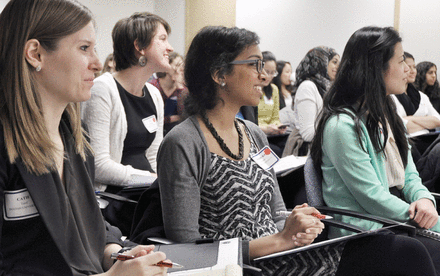
Students listen to a public health symposium held in Cambridge, Massachusetts.
The Mississippi Public Health Association of Jackson, Mississippi, and its many partners celebrated National Public Health Week with a gubernatorial proclamation, a lecture on health disparities, community awards and other activities. Association leaders, along with representatives from local universities, the Mississippi State Department of Health and the Partnership for a Healthy Mississippi met with Gov. Phil Bryant as he signed a proclamation acknowledging NPHW throughout the state. The APHA-affiliated association used NPHW as an opportunity to present its Community Service Awards to the Mississippi Breastfeeding Coalition for its breastfeeding advocacy and to the state Department of Finance and Administration, which had implemented a variety of workplace wellness initiatives. One of MPHA’s partners, the Mississippi Tobacco-Free Coalition of Madison, Yazoo and Holmes Counties, celebrated a big win during NPHW, with the cities of Lexington and Pickens passing comprehensive smoke-free ordinances.
In the virtual world, MPHA sent daily email blasts related to each day’s NPHW theme to its members and to state health department employees. Each email message encouraged people to sign APHA’s Healthiest Nation pledge and petition. The Affiliate also participated in APHA’s NPHW Twitter chat on April 8.
To close out the week, MPHA co-sponsored a two-mile walk, which kicked off with remarks from state public health leaders, including MPHA President and APHA member Ron Davis, MBA, and Thomas Dobbs, MD, MPH, state epidemiologist at the Mississippi State Department of Health. Following the remarks and before the walk, participants were encouraged to take part in a warm-up dance inspired by first lady Michelle Obama’s Let’s Move! campaign. Walkers who successfully crossed the two-mile finish line were presented with recognition ribbons.
Jackson State University in Jackson, Mississippi, held a Health Disparities Research Symposium in observance of National Public Health Week. The event featured a presentation by APHA member Evelyn Walker, MD, MPH, director of the Office of Health Promotion and Health Equity and the Office of Health Disparity Elimination at the Mississippi State Department of Health.
In celebration of National Public Health Week and National Minority Health Month in April, the Health Equity Cross Campus Interest Group at Mississippi State University in Starkville, Mississippi, hosted an event on “Hot Topics in Health Equity.” The event’s keynote speaker was Bettina Beech, DrPH, MPH, associate vice chancellor of population health at the university’s Medical Center, who spoke about health disparities and related social determinants. In addition to the equity event, the university’s Department of Health Education and Wellness celebrated NPHW with a variety of campus presentations aimed at improving health among students and covered topics such as stress management and eating disorders.
MISSOURI
Students at Stephens College in Columbia, Missouri, raised awareness about alcohol and sexual behavior during National Public Health Week. To tackle the issues, students conducted a survey to gauge their peers’ knowledge of sexual behaviors. With the survey responses in hand, student organizers focused their NPHW activities on sexually transmitted diseases, contraception and the effect of alcohol on sexual behavior. They created pamphlets, brochures and posters and presented the materials prior to students leaving for spring break. The activity also includes interactive games and prizes.
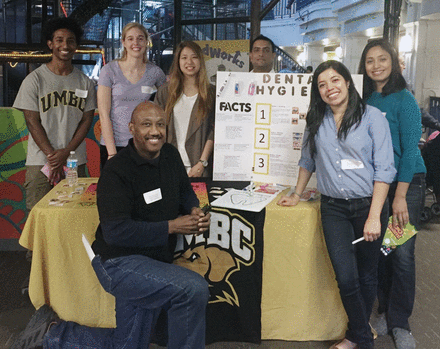
University of Maryland, Baltimore County students present kid-friendly health information at a Baltimore city museum.
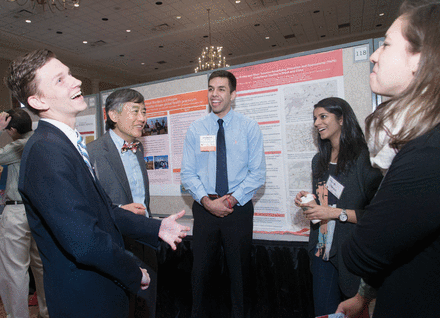
University of Maryland public health students in College Park, Maryland, participate in a research poster competition.
University of Maryland College Park photo courtesy Thai Nguyen
The University of Missouri Master of Public Health Program in Columbia, Missouri, celebrated National Public Health Week with a free film screening of the documentary, “The Homestretch,” which follows three homeless teens in Chicago. Attendees were then engaged in a discussion about homelessness.
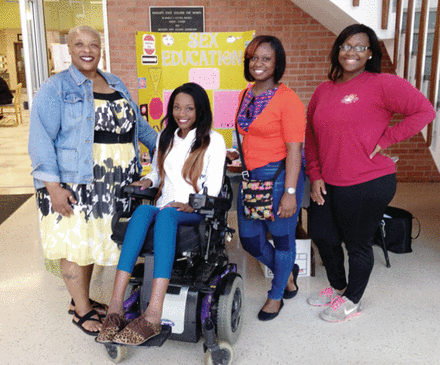
Mississippi University for Women students share information on sexual health.
The U.S. Department of Health and Human Services Region VII office welcomed more than 140 state officials, community health workers, faith-based leaders, college students and public health educators to a gathering in Kansas City, Missouri, to celebrate National Public Health Week. The event focused on creating a healthier nation and opened with remarks about the Affordable Care Act. Two panel discussions offered effective strategies to engage residents in creating healthier communities, tips for building community partnerships and resources for continued action. Among the event’s speakers were Stephene Moore, regional director for HHS Region VII, and Shary Jones, PharmD, MPH, deputy regional health administrator for the Office of the Assistant Secretary for Health for Region VII. In addition to speakers, the NPHW event featured a number of exhibitors, such as federal agencies, community- and faith-based organizations and a mobile market.
In Liberty, Missouri, the Clay County Public Health Center kicked off National Public Health Week with a child car seat check in partnership with a local fire department, ultimately reaching 15 families and giving away nearly 20 convertible and booster car seats. Public health center staff also took part in a walking day and many signed a pledge to eat healthy and be active. To engage the larger community in NPHW, staff hosted a series of town hall meetings, where attendees could voice their opinions on the current state of the communities’ health and ways to improve residents’ well-being. The center also used NPHW to recognize the contributions of its volunteers, organizing a luncheon and giving away prizes.
Saint Louis University’s College for Public Health and Social Justice in St. Louis, Missouri, hosted its Third Annual Undergraduate Public Health Scholar Bowl during National Public Health Week. During the event, teams of undergraduates competed in a trivia challenge and case study presentation to win cash prizes and recognition for their school. Seven schools took part in the challenge, including Johns Hopkins University, Kent State University and George Washington University. Macalester College and George Washington University took first and second place, respectively, in the trivia challenge, while Johns Hopkins and Mercyhurst University won first and second place, respectively, in the case study competition. The competition concluded with a keynote address from Norman White, PhD, an associate professor of criminology and criminal justice at Saint Louis University.

University of Maryland School of Medicine public health students in Baltimore show how they plan to be healthier.
University of Maryland School of Medicine photo courtesy Yimei Wu
NEBRASKA
The East Central District Health Department in Columbus, Nebraska, celebrated National Public Health Week with the grand opening of its new health department building. The health agency hosted an open house and welcomed more than 200 residents for a tour of the new building. During the event, health staff educated visitors about the department’s services and programs, offered take-home information and gave out copies of its annual report.
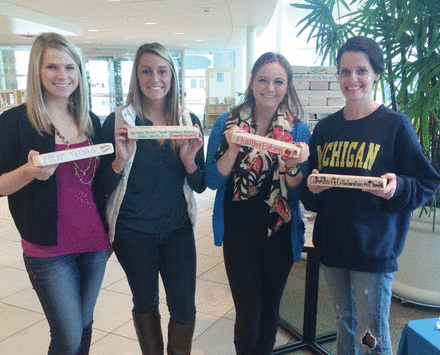
Grand Valley State University students in Allendale, Michigan, share a public health-related version of the game Jenga.
In Omaha, Nebraska, the University of Nebraska Medical Center College of Public Health Student Association kicked off National Public Health Week with a group discussion on the best ways to engage fellow students and community organizations in NPHW celebrations. Tuesday offered a professional development workshop that focused on public health leadership skills as well as a showing of the film “Remote Area Medical,” a documentary about the organization of the same name that brings health services to underserved communities. Following the film, a panel of speakers, including a rural health expert and family medicine physician, discussed ways to promote affordable and accessible care for all Nebraskans. Also during NPHW, students hosted a showing of “The Raising of America,” which explores early childhood development, and a lecture with Jennifer Reich, PhD, associate professor in the University of Colorado-Denver Department of Sociology, who spoke about vaccine refusal and reproductive rights.
Also during NPHW, the annual College of Public Health student research poster contest was organized to celebrate Public Health Student Day. Twenty abstracts were selected for poster presentations. NPHW activities ended with a volunteer day at the local Habitat for Humanity, and which attracted more than 50 volunteers.
NEVADA
The Northern Nevada Chapter of the Nevada Public Health Association, which is headquartered in Reno, Nevada, held a variety of activities during National Public Health Week. The week kicked off with a food drive to benefit the Food Bank of Northern Nevada and involved local businesses, universities and local health agencies. Throughout the week, the chapter publicized an online health facts quiz, which focused on current public health topics and offered participants educational materials. In all, 83 people completed the quiz. A chapter leader also presented at an exhibit hosted at the state Division of Public and Behavioral Health in Carson City, Nevada. Other presentations during NPHW included those on rural and frontier health in Nevada, emergency management, medical marijuana and the decision by national retailer CVS Health to stop selling tobacco.
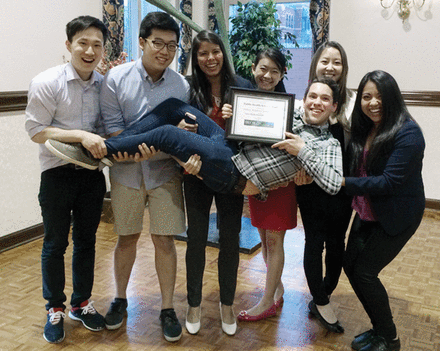
Johns Hopkins University students win a prize at a public health scholar bowl held at Saint Louis University in St. Louis.
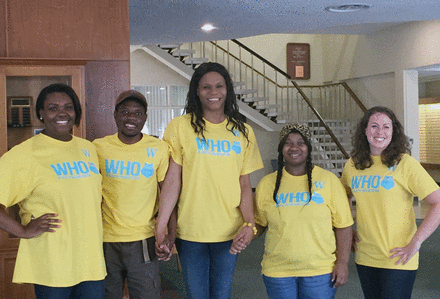
Mississippi University for Women students celebrate National Public Health Week in Columbus, Mississippi.
The Northern Nevada Chapter also collaborated with the Washoe County Health District and the University of Nevada-Reno Graduate Society of Public Health to host an educational event on the role of food manufacturers in the obesity epidemic. The event featured a showing of the documentary “Feeding Frenzy: The Food Industry, Marketing and the Creation of a Health Crisis.” NPHW wrapped up with a presentation from interns from the Nevada Division of Public and Behavioral Health.
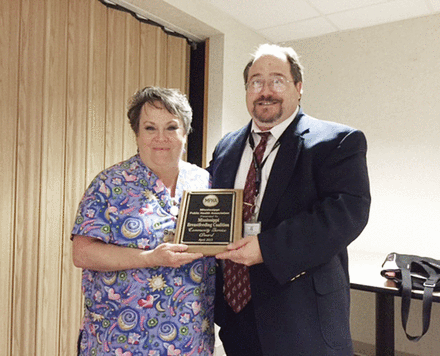
The Mississippi Breastfeeding Coalition president receives an award from the Mississippi Public Health Association.
NEW JERSEY
The Alliance Center for Independence in Edison, New Jersey, which serves people with cognitive disabilities, celebrated National Public Health Week with the kickoff of its Spring into Summer Walking Group. The monthly walking group was designed to encourage people with disabilities to stay physically active.
The Montclair State University Department of Health and Nutrition Sciences’ public health program in Montclair, New Jersey, welcomed more than 125 students, community partners and local legislators to its National Public Health Week screening of “God Grew Tired of Us,” a documentary about a group of young boys who fled from Sudan. The screening was followed by a panel discussion and included remarks from Nathaniel Nyok, founder of Sudanese- American Voices for Education Services and one of thousands of young boys who fled the country in the late 1980s for fear of losing their lives. The discussion centered on public health issues related to war, poverty, immigration, mental health, global health, racism and social justice.
In Piscataway, New Jersey, the Rutgers School of Public Health observed National Public Health Week with its 20th Annual Public Health Symposium, which has been held during every NPHW since 1996. This year’s symposium had a theme of “Eliminate Health Disparities: Strategies That Make a Difference” and was kicked off with an address from Dwayne Proctor, PhD, who directs health disparities work at the Robert Wood Johnson Foundation. The symposium also featured an address from Carolyn Daniels, DHSc, MEd, director of the New Jersey Department of Health Office of Minority and Multicultural Health, who presented an overview of health disparities in the state.
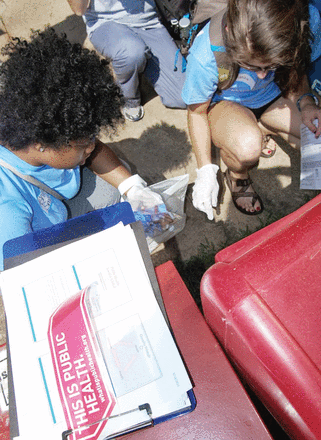
University of North Carolina-Chapel Hill students pick up cigarette butts during a public health field trip.
Also during the symposium, attendees listened to a panel discussion about programs to address health inequities, such as those addressing physical activity and chronic disease management, viewed poster presentations and picked up educational materials from more than a dozen public health organizations. The symposium featured the reading of two proclamations from Gov. Chris Christie, one acknowledging NPHW and another acknowledging Multicultural and Minority Health Month. More than 175 public health professionals and students attended the event.
NEW MEXICO
The Native Health Initiative in Albuquerque, New Mexico, hosted its 6th Annual Indigenous Health Leadership Institute as part of National Public Health Week. The institute welcomed 15 health care professionals from around the country to learn more about indigenous communities, their histories and traditions. During the institute, participants visited a local senior center, met with youth leaders and learned about youth-driven initiatives, and met with local community members who have led projects on recycling, physical activity, sobriety and sustaining traditional pottery practices. Participants also had the chance to learn about traditional cooking and nutrition, meet with indigenous healers, and take part in workshops on art therapy and reducing disparities in mental care.
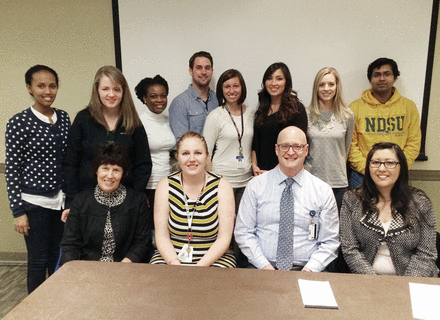
North Dakota State University students in Fargo, North Dakota, discussed health careers and opportunities.
In Las Vegas, New Mexico, New Mexico Highlands University organized a National Public Health Week Health Fair on April 6. The event was attended by students, faculty and community residents, and included participation from organizations such as Smoke Free Santa Fe, the San Miguel office of the New Mexico Department of Health and El Centro Family Health. The university also hosted a student health poster showcase, sharing information on topics such as obesity, stress, wellness and physical activity. Attendees included area high school students.
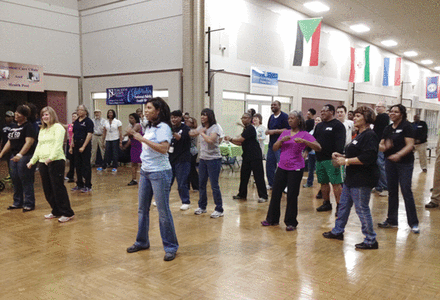
Participants in a National Public Health Week Spring Walk perform a warmup dance in Jackson, Mississippi.
NEW YORK
The Graduate Student Organization of the School of Public Health at the University at Albany in Albany, New York, celebrated National Public Health Week with an event to raise funds for sanitation and potable water efforts in El Cerrito, Dominican Republic. The event included a silent auction, raffle and speakers and performers. During the event, the campus’ APHA Student Assembly liaison set up an informational table.
The New York State Department of Health in Albany, New York, kicked off the 20th anniversary of National Public Health Week with a new social media campaign, #GetFitNYS. APHA member and Acting State Health Commissioner Howard Zucker, MD, JD, toured the state, highlighting local programs aimed at fighting obesity. In New York, more than 25 percent of adults are obese and nearly 36 percent are overweight.
Zucker visited programs across the state. In Buffalo, New York, he joined members of Club 99, a free fitness program for residents older than 60, to highlight the importance of physical activity among older adults. In Syracuse, New York, he visited a program that partners college athletes with local youth to provide education about sports safety, nutrition and avoiding unhealthy habits. In Albany, Zucker visited an urban community garden that provides hands-on education to families about nutrition and growing food. In Long Island, New York, he learned about the Long Island Health Collaborative’s Long Island Walks Initiative, which sponsors walking events and teaches residents about the health benefits of walking. And in West Haverstraw, New York, Zucker and members of Helen Hayes Hospital’s Adapted Sports and Recreation Program highlighted the importance of physical activity among people with disabilities and traumatic injuries.
In Brooklyn, New York, God’s Love We Deliver, which delivers free nutritious meals to people living with serious illnesses, celebrated National Public Health Week with a series of blog posts coinciding with each day’s NPHW theme. The blog post highlighting the theme of “Raising the Grade” discussed the failure of the U.S. health care system to treat patients in a holistic manner, pointing to the Ryan White Treatment Modernization Act, which provides health care and social services to people living with HIV/AIDS, as an example of an initiative that takes a comprehensive approach to health. The blog post on “Starting from ZIP” discussed health difference by ZIP codes and the importance of transitioning care from the hospital to the community. A mid-week blog post focused on the fall 2015 release of the updated Dietary Guidelines for Americans and the importance of addressing sustainability and food insecurity. A blog post about the daily NPHW theme of “Building Broader Connections” focused on building partnerships to improve health and highlighted the organization’s growing collaborations. On the last day of NPHW, which had a theme of “Building on 20 Years of Success,” the blog focused on progress in caring for people with HIV/AIDS and significant reductions in HIV/AIDS-related deaths.
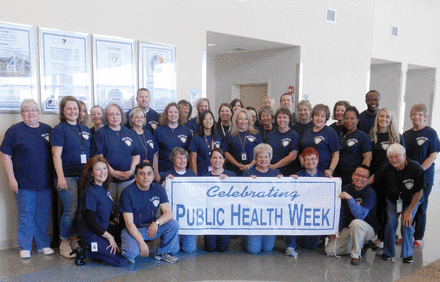
Clay County Public Health Center workers celebrate National Public Health Week in Liberty, Missouri.
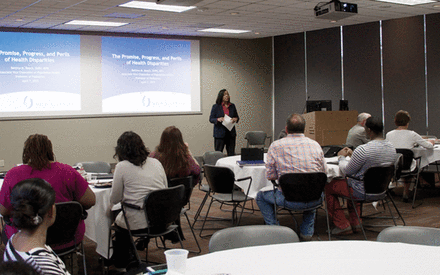
A health equity interest group at Mississippi State University in Starkville, Mississippi, hosts an event on health disparities.
Hofstra University’s School of Health Sciences and Human Services in Hempstead, New York, along with its Master of Public Health program and student-led Society of Public Health Advocates, organized a diversity of events to celebrate National Public Health Week. Organizers partnered with the Alzheimer’s Foundation of America to host workshops and a concert to raise awareness about dementia and ways to care for patients and caregivers. NPHW events also included a screening of the early childhood development documentary “The Raising of America,” a discussion of HIV treatment and prevention, and a conversation about the lingering mental health effects of Superstorm Sandy. Organizers also discussed ways to integrate oral health into overall health as well as ways to reach at-risk residents through creative partnerships.
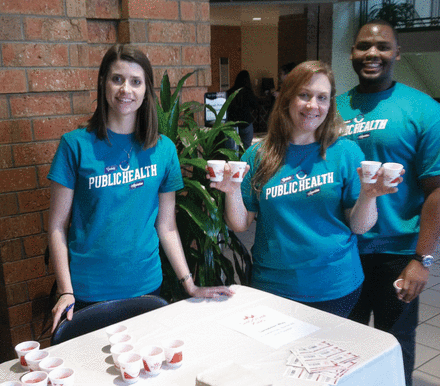
The Graduate Public Health Association of the University of North Carolina-Charlotte hosts a health fair.
Hofstra University students also partnered with the Nassau County Health Department to hold the 2nd Annual Minority Health Conference, which included a panel discussion on suburban health and an Interdisciplinary Student Film Competition, which considered short videos on minority health priorities. The conference culminated in a health fair, which welcomed more than 30 community-based organizations and engaged more than 300 high school and college students, faculty, staff and community members. Throughout the week, MPH students led campus-wide health promotion events, such as a fitness challenge.
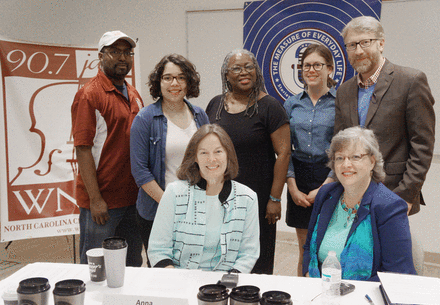
University of North Carolina-Chapel Hill’s Gillings School of Global Public Health hosts a radio interview with researchers.
In New York City, New York, the 2x2 Project, which reports on the science of public health and is sponsored by the Columbia University Mailman School of Public Health Department of Epidemiology, recognized National Public Health Week with a competition pitting 16 of the year’s population health concerns against each other. The online tournament featured four rounds of competitions and attracted the participation of thousands of Web visitors. Visitors picked what they believed to be the year’s most significant public health issues, such as measles or climate change, and the competition culminated in a championship round during NPHW. The final four issues include the fifth anniversary of the Affordable Care Act, the rallying cry of “black lives matter,” climate change and Ebola. The winning topic was the global Ebola outbreak.
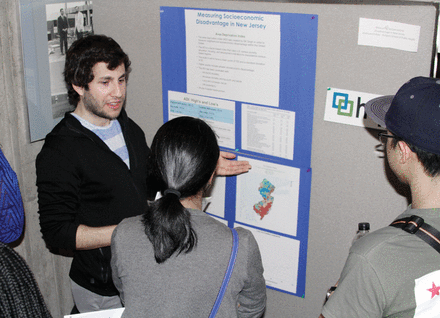
Posters are shared at Rutgers in Piscataway, New Jersey.
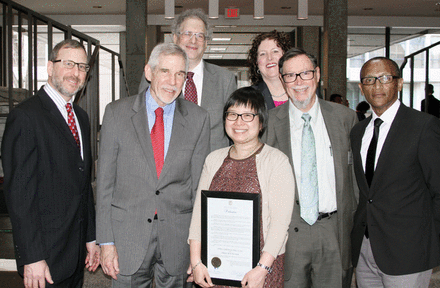
Rutgers School of Public Health faculty receive a National Public Health Week proclamation in Piscataway, New Jersey.
Dutchess County Healthy Families in Poughkeepsie, New York, celebrated National Public Health Week with a ribbon-cutting ceremony for the Nursing Nook, a new public breastfeeding space at a local community center. Dutchess County Healthy Families and its partners, including the Dutchess County Health Department, used the event to present their plans for making the county friendlier for breastfeeding. The new Nursing Nook is open to mothers Monday through Friday and offers a private space where women can breastfeed and pump.
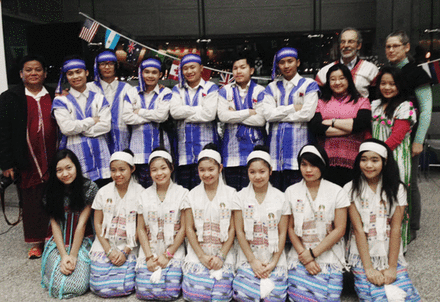
The University at Albany, New York, hosted a fundraiser.
Nursing students at Molloy College in Rockville Centre, New York, celebrated National Public Health Week by rallying around the goal of creating the healthiest nation in one generation by 2030. Each participating nursing student picked a health promotion topic, reached out to the community for related information, and developed teaching materials, poster boards and games to share with students on campus. To kick off NPHW, the nursing students hosted a health promotion and disease prevention fair for fellow students that offered information on smoking cessation, sun protection, first aid and disaster preparedness.
The Lerner Center for Public Health Promotion at Syracuse University in Syracuse, New York, celebrated National Public Health Week with an event titled “Mindfulness in Movement.” The free event was designed to promote mindfulness and physical activity on campus and included a lunch and lecture. More than two dozen students, staff and faculty attended the event.
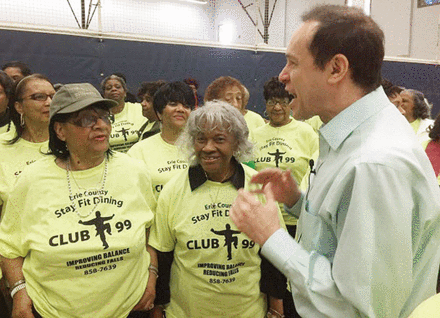
New York Acting State Health Commissioner Howard Zucker, right, talks to members of Club 99, a free fitness program for residents older than age 60 based in Buffalo, New York.
In Syracuse, New York, the Upstate Medical University’s Department of Public Health and Preventive Medicine as well as students in the Central New York Master of Public Health Program celebrated National Public Health Week with a panel discussion on the vaccinations for health care providers, which welcomed 50 attendees. Students also organized a Children’s Health Fair at a Salvation Army, where children took part in activities designed to educate about physical activity and nutrition. Other NPHW activities included a presentation about a local initiative that provides breast health education and free screenings to underserved women as well as events that raised awareness about stress-reducing techniques, such as yoga and hypnosis.
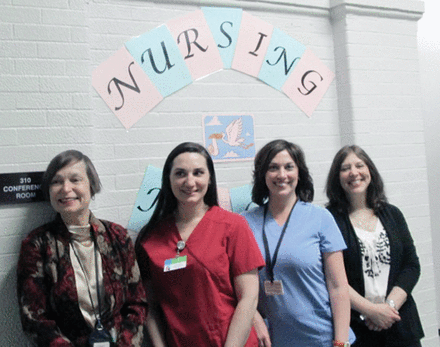
New breastfeeding center opens in Poughkeepsie, New York.
The Oneida County Health Department in Utica, New York, hosted an online chat in observance of National Public Health Week. Residents were invited to join the chat and ask questions about flu shots, car seat safety, rabies and Lyme disease. Depending on their question, participants were enrolled in a private, one-on-one conversation with a health department worker. Also during NPHW, health staff promoted a poster illustrating the health department’s many accomplishments between 2012 and 2014, such as conducting more than 4,300 restaurant inspections, providing more than 2,500 cancer screenings and conducting nearly 13,000 communicable disease investigations. The poster was emailed to the health department’s various community partners and coalition groups. The department’s director of health, Phyllis Ellis, MS, FACHE, also sent letters to local officials highlighting the department’s accomplishments and promoting NPHW.
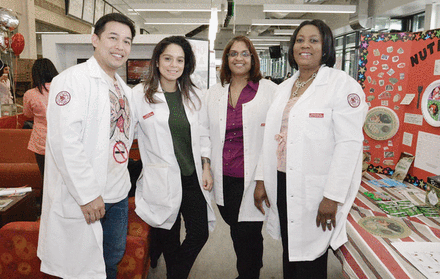
Molloy College nursing students in Rockville Centre, New York, present teaching materials and posters on public health issues.
Rockville Centre photo courtesy Molloy College Office of Development
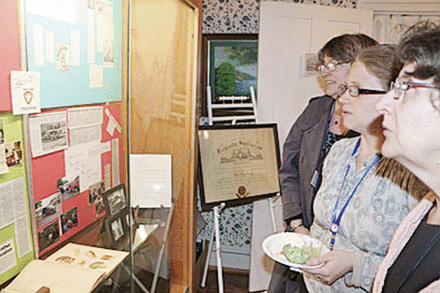
A Montour Falls, New York, museum features public health.
In Watkins Glen, New York, the past, present and future of public health in Schuyler County was featured in an exhibit at the Schuyler County Historical Society Museum. Local officials attended a reception during National Public Health Week and browsed the many photos, news clippings, scrapbooks, brochures and other items that tell the story of the county’s public health history.
NORTH CAROLINA
At the University of North Carolina Gillings School of Global Public Health in Chapel Hill, North Carolina, students, faculty and staff used National Public Health Week to engage others in thinking about ways to make the healthy choice, the easy choice. For example, school leadership gathered information via an online survey about what a culture of health would look like at the school. In addition, APHA member Barbara Rimer, DrPH, MPH, dean of the Gillings School of Global Public Health, promoted a culture of health on her blog. Organized walking groups met throughout NPHW to encourage 15-minute physical activity breaks. Also in celebration of NPHW, the North Carolina Institute for Public Health hosted a film screening and discussion of “Dogs on the Inside,” a documentary about partnerships between shelter dogs with inmates. The Bouncing Bulldogs, an organization of jump rope enthusiasts, visited the campus to encourage physical activity and were the recipient of the school’s 2015 Public Health Champion Award.
The Graduate Public Health Association of the University of North Carolina in Charlotte, North Carolina, sponsored a health fair in observance of National Public Health Week. The fair featured a wide range of exhibits, including displays on domestic violence, nutrition and wellness, women’s health, reproductive health and health promotion. Attendees could also take part in posture and balance screenings, yoga and meditation, and sample healthy food choices.
NORTH DAKOTA
During National Public Health Week, students from the Master of Public Health Program and the Public Health Association at the University of North Dakota in Grand Forks, North Dakota, hosted events based on the seven dimensions of wellness. A highlight of the week was a flash mob, which was organized to encourage physical activity. Students organized three flash mobs, which are groups of people who suddenly assemble in public to perform, in areas of campus where students would least expect such an activity. A handful of seniors from a local Zumba class joined the flash mobs as well. Other NPHW events included a free yoga class, a trash cleanup, and a free-hugs-and-orange-juice booth. Students also sponsored a public health selfie contest, in which community members took photos of themselves performing a public health action and posted them to Facebook.
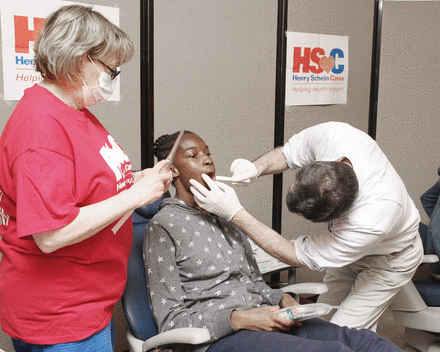
A minority health conference from Hofstra University and Nassau County Health Department gives free dental screenings.
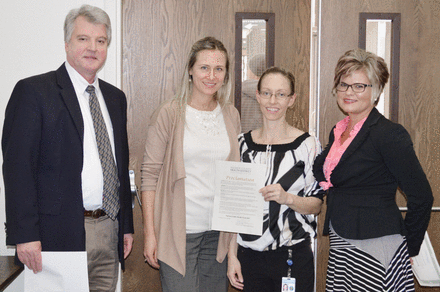
Nevada Public Health Association’s Northern Nevada chapter celebrates a National Public Health Week proclamation.
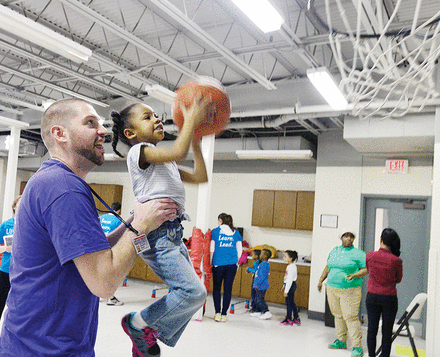
Central New York Master of Public Health students and Upstate Medical University hold a children’s health fair.
Central New York photo courtesy William Mueller, SUNY Upstate New York Medical University
OHIO
The University of Mount Union’s Public Health Club in Alliance, Ohio, organized events to support young adult health during National Public Health Week. Events included talks on breast and testicular cancer screening and diagnosis, a free yoga session, a stress reduction event in which students made their own stress balls, and a presentation about healthy eating and portion sizes. Other NPHW activities included a global health fair with samples of food from different countries and healthy meals cooked by student chefs.
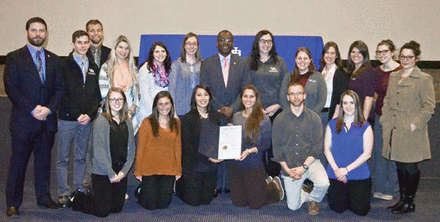
University at Buffalo students wrap up a screening of a film on music’s effects on memory loss in seniors.
The Ashland County-City Health Department in Ashland, Ohio, celebrated National Public Health Week with a retrospective on the 20th anniversary of NPHW. The event was part of the agency’s Public Health Day Celebration, which welcomed Blaise Congeni, MD, a pediatric infectious disease specialist from Akron Children’s Hospital, as its guest speaker. Congeni spoke about several topics, including the incorrect prescribing of antibiotics, multidrug-resistant tuberculosis and vaccine-hesitant parents. The celebration also featured a reading of NPHW proclamations from President Barack Obama and Gov. John Kasich. Department Health Commissioner Jelayne Dray, MSN, RN, honored those who made significant contributions to controlling a 2014 measles outbreak. More than 90 people attended the celebration, at which health department staff and members of the local Medical Reserve Corps cooked breakfast for guests.
In Bowling Green, Ohio, Bowling Green State University hosted its inaugural Public Health Symposium in conjunction with National Public Health Week. The symposium, which had a theme of social media and risk communication, featured a keynote address from APHA member Bechara Choucair, MD, MS, former commissioner of the Chicago Department of Public Health. Choucair spoke to an audience of more than 100 people about his experience using social media to combat electronic cigarette use and encourage activity. Following the keynote was a panel of speakers who discussed the use of social media to educate about Ebola, using social media to communicate about weather-related emergencies, and the role of social media in communicating a local waterborne disease risk. The symposium also hosted poster presentations and vendor booths.
The Cincinnati Health Department in Cincinnati, Ohio, observed National Public Health Week with its annual event at the city’s Fountain Square, with a goal of promoting public health services in the community. The health department set up booths on a range of topics, including maternal and infant health, reproductive health, pool safety, food safety, injury prevention, tobacco cessation and community health services. Public health nurses provided 22 body mass index screenings and referrals, and the local Healthy Moms and Babes outreach ministry conducted five blood pressure screenings, five sexually transmitted disease and pregnancy screenings, and provided health education to nearly 100 people. In addition to health services, attendees also enjoyed demonstrations from a nationally recognized double-Dutch team, saw dance performances and won raffle prizes.
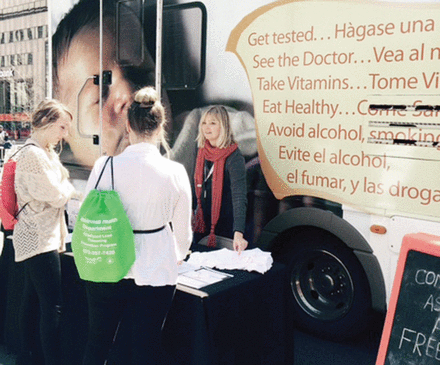
Healthy Moms and Babes, an outreach ministry in Cincinnati, conducts health screenings at the city’s Fountain Square.
OREGON
The Oregon State University College of Public Health and Human Sciences’ Public Health Club in Corvallis, Oregon, observed National Public Health Week with a Public Health Fair, which focused on issues facing the college community, such as stress and safety. During the fair, faculty from the College of Public Health and Human Sciences were on hand to answer questions about graduate programs. Among the fair participants were representatives from the Boys and Girls Club of Corvallis, the Corvallis Fire Department, the Heartland Humane Society and a number of campus service programs. Capping off the week of events was a lecture from Richard Besser, MD, chief health and medical editor for ABC News, who offered advice to students entering the public health field and spoke about the importance of communicating public health messages.
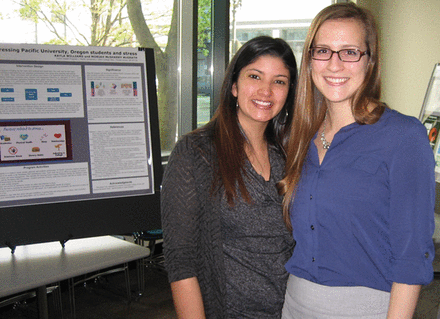
Students from Pacific University in Forest Grove, Oregon, participate in a poster session.
Pacific University photo courtesy Moriah McSharry McGrath
Undergraduate public health students from Pacific University in Forest Grove, Oregon, celebrated National Public Health Week by participating in the annual Oregon Master’s of Public Health Student Poster Symposium, which was held in Portland, Oregon. Thanks to a grant from the Oregon Public Health Association’s Health Education and Promotion Section, students traveled to Portland to share their work on issues such as comprehensive sex education and migrant farmworker health. Following their participation at the symposium, students presented their work during Pacific University’s Senior Projects Day in May, which celebrated the students’ creative achievements.
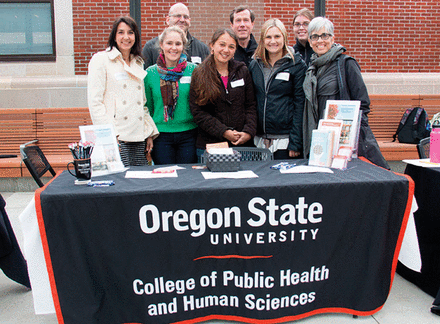
A NPHW public health fair is held at Oregon State University in Corvallis, Oregon.
Oregon State photo courtesy OSU College of Public Health and Human Services
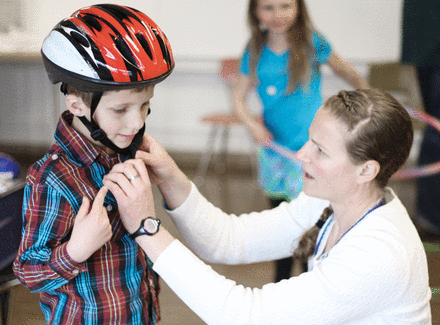
Kids learn about safety at a NPHW scavenger hunt event sponsored by Oregon’s Klamath County Public Health.
Oregon scavenger hunt photo courtesy Nora Avery-Page/The Herald and News
In Klamath Falls, Oregon, Klamath County Public Health staff organized a scavenger hunt at the local YMCA to observe National Public Health Week. The scavenger hunt included stations such as a school, workplace, clinic, park, grocery store and community center to demonstrate how the availability of such resources affects people’s health. For example, after visiting the school station and getting one of three types of diplomas — a GED, a high school diploma or a college diploma — kids went to the work station and received an amount of money that would determine how many of the other stations they were able to visit. Each station had health-based prizes. The scavenger hunt ended with kids visiting all of the stations and receiving prizes as well as a discussion about the relationship of decisions in early life to lifelong health. The event was also featured in the local newspaper.
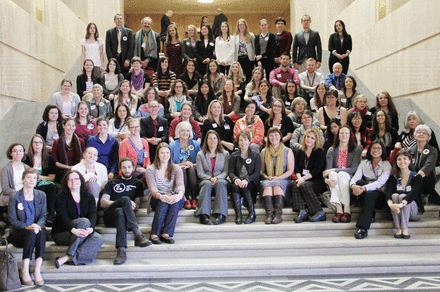
The Oregon Public Health Association holds its Capitol Visit Day in Salem, Oregon, to advocate for public health issues.
Oregon Public Health Association photo courtesy Megan Bailey
Inspired by the NPHW theme of “Building Broader Connections,” Klamath County Public Health hosted a luncheon for community partners and challenged invitees to bring someone who does not currently partner with the health department. Attendees represented a broad spectrum of community organizations and professions, including clinicians, mental health professionals and tribal health officials. The luncheon, which was designed to facilitate new community connections, also featured an informational board about the County Health Rankings and its contributing health factors.
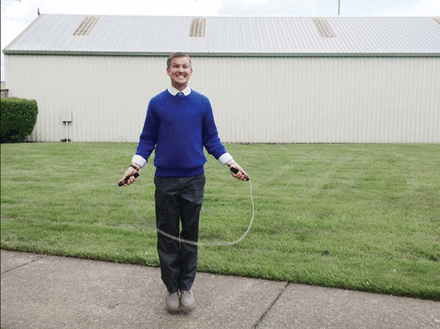
The University of Western States in Portland, Oregon, hosts a movement challenge.
In Portland, Oregon, the Oregon Public Health Association sponsored its 2015 OPHA Capitol Visit Day in observance of National Public Health Week and to advocate for public health issues. The advocacy day welcomed 130 students, community members and public health professionals, who gathered in support of public health policy at the Oregon State Capitol in Salem, Oregon. The event featured presentations from state senators, Capitol tours, advocacy training, updates on the association’s policy priorities and discussions on public health policy and funding. Participants also learned about bills being considered during the 2015 legislative session and met with their representatives to advocate for public health. Among the attendees were nearly 80 nursing students and faculty from Oregon Health and Science University.
The University of Western States in Portland, Oregon, used National Public Health Week to welcome students back from spring break with a physical activity challenge and the chance to earn prizes. Organizers used a poster on “Back and Neck Pain: A Global Burden,” which was created by APHA’s Chiropractic Health Care Section, to spread awareness about the issue around campus and hosted a #WellnessMinute contest on social media.
The contest encouraged students to post a short video about their favorite wellness tip or health topic. The university also highlighted staff and faculty directly involved in public health by posting their biographies on social media.
PENNSYLVANIA
Public health students at Keystone College in La Plume, Pennsylvania, sponsored three campus events during National Public Health Week. A public health fair with 14 student-designed booths addressed topics such as post-traumatic stress disorder and lesbian, gay, bisexual and transgender health and included free blood pressure and asthma screenings. A movie screening of “A History of Violence” drew attention to gun violence and led to a discussion on preventing such violence on campus. Students also organized a discussion on violence and mental health care with bioethicist Arthur Caplan, PhD, director of the Division of Medical Ethics at New York University’s Langone Medical Center’s Department of Population Health.
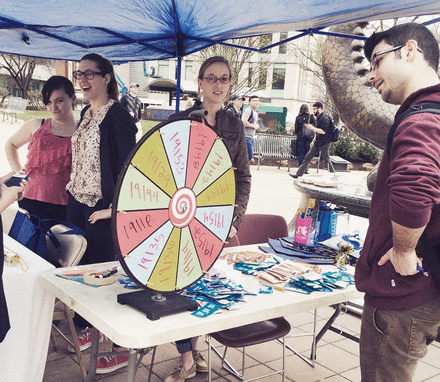
Drexel University students ask peers to spin a ZIP code wheel and learn about Philadelphia-area health disparities.
In honor of National Public Health Week, Let’s Move Pittburgh and the local ivivva store, which sells active wear for girls and young women, hosted a free outdoor yoga class for families in Pittsburgh, Pennsylvania. The event welcomed more than 80 parents and children to the Phipps Conservatory and Botanical Gardens, where attendees first took part in a craft activity. The craft activity encouraged participants to write down how yoga made them feel. Their answers were then taped to a banner that was displayed during the yoga class. The yoga class was followed with a 10-minute relaxation exercise. The yoga class was so popular that the sponsors plan to make it a regular event.
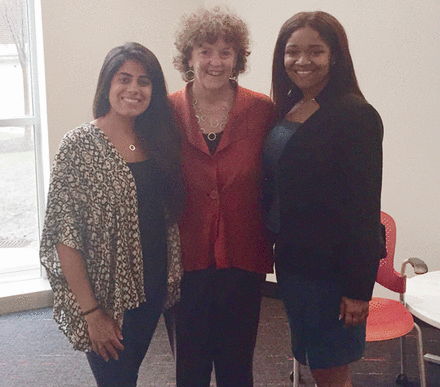
Nan Feyler, center, Philadelphia’s deputy health commissioner, meets Drexel students.
The Public Health Student Association of Commonwealth Medical College in Scranton, Pennsylvania, recognized National Public Health Week with a variety of events, such as lunch-time walks and lectures, and encouraged peers to sign APHA’s pledge to help create the healthiest nation. The week culminated with a happy hour event, Happy for Health, which raised more than $400 for United Neighborhood Centers of Northeastern Pennsylvania’s Community Health Program.
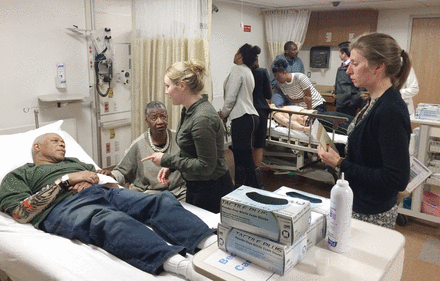
Drexel University students participate in an interprofessional health simulation to recognize National Public Health Week.
TENNESSEE
The Anderson County Health Department in Clinton, Tennessee, hosted a lunch lecture on “Creating Opportunities for Children Born Drug-Dependent” in honor of National Public Health Week. The event was organized in response to a growing caseload of families dealing with neonatal abstinence syndrome, which occurs as a result of a woman’s drug use during pregnancy. More than 50 caregivers, social workers, health professionals and educators attended the event, which featured presentations on the opioid abuse epidemic and its effects on newborns as well as a panel discussion about a state law that authorizes the criminal prosecution of women who use drugs during pregnancy. Attendees left with packets of information and local resources.
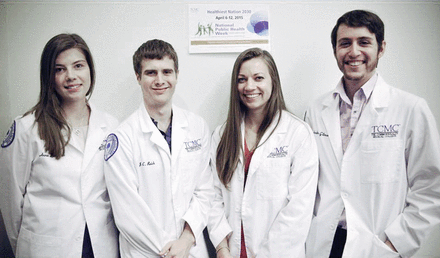
Commonwealth Medical College students in Scranton, Pennsylvania, celebrate National Public Health Week.
Commonwealth Medical College photo courtesy Heather Davis
The University of Tennessee Department of Public Health’s Graduate Student Association in Knoxville, Tennessee, celebrated National Public Health Week with a campus-wide campaign to raise awareness of a variety of public health topics, including tobacco use, nutrition, physical activity, mental health and sexual health. With the support of several community organizations, including the Knox County Health Department, the Graduate Student Association provided health education and passed out healthy snacks, hand sanitizer, lip balm, stress relievers, pens, brochures and informational fact sheets. During one activity, students were asked to answer questions about their favorite healthy snack or favorite way to cope with stress. Students then took photos with their answers in a specially created public health picture frame and the pictures were posted to Facebook and featured in a YouTube video.
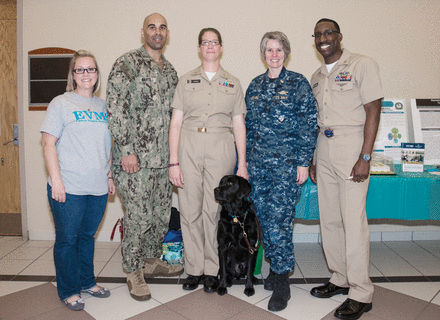
Medical students in Norfolk, Virginia, promote health and wellness in a nearby military community during NPHW.
The University of Memphis School of Public Health Public Health Student Association in Memphis, Tennessee, organized a week of events to observe National Public Health Week. The association hosted a zombie apocalypse event to raise awareness about emergency preparedness, partnering with the university’s Drama Club members, who portrayed the zombies. Next, association members encouraged their peers to sign a pledge to protect the environment and community. Attendees at the School of Public Health’s Public Health Awards Luncheon signed the pledge, which was later displayed at the School of Public Health. “Midday Moves,” a physical activity break at noon, hosted a soccer game and invited the whole campus to participate. The association also hosted an interdisciplinary forum, which welcomed colleagues from anthropology, social work and dietetics to join public health students and faculty in a discussion of wellness, healthy environments, crime and violence, and health equity. The week ended with a School of Public Health Family Picnic, which featured healthy foods and sports competitions.
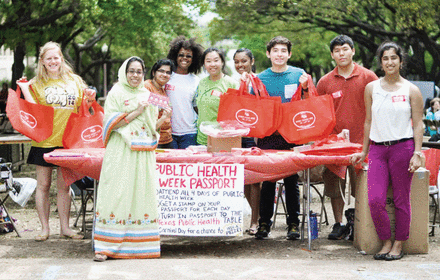
University of Texas at Austin’s student-led Texas Public Health organization celebrates National Public Health Week.
In Nashville, Tennessee, the Tennessee Public Health Association celebrated National Public Health Week with its Fifth Annual Visionary Awards, which recognize individuals or groups that work to improve the health of their communities. This year’s awards honored public health efforts to offer reversible, long-acting contraceptives to female inmates; people instrumental in launching the first farmers market in Centerville, Tennessee; and the Lift Wellness Center in Jackson, Tennessee, which is the area’s only medical fitness facility. For the second year in a row, the APHA-affiliated association also sponsored a Student Video Challenge during NPHW, which challenges public health students to create a two-minute video based on the year’s NPHW theme.
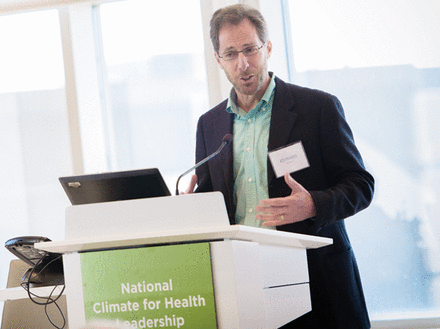
A George Mason University professor discusses the health effects of climate change at an event in Washington, D.C.
TEXAS
At the University of Texas at Austin in Austin, Texas, the student-led Texas Public Health organization celebrated National Public Health Week with four interactive events. To begin the week, students hosted a fair featuring 20 health-related organizations and offering information on a variety of topics, such as nutrition and drug and alcohol abuse. On Tuesday of NPHW, the student group hosted a Public Health Career Fair and encouraged students to bring their resumes and meet with public health professionals about internship and job opportunities. Global Health Night featured a swing dance performance, an improvisational comedy troupe and Chinese dragon dancers. The event also featured foods from around the world and silent auction, which raised more than $700 for an organization that addresses neglected tropical diseases. The final event was a health carnival with booths on topics such as alcohol, nutrition and breast cancer. Overall, students passed out more than 3,000 condoms, 4,000 hand sanitizer packets and 2,000 educational fliers during the week.
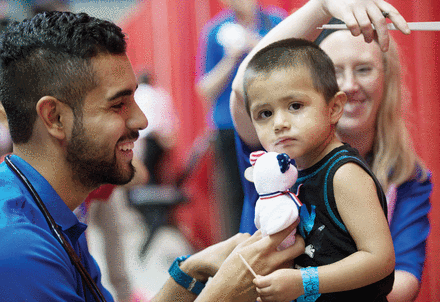
A boy receives medical services via Your Best Pathway to Health in San Antonio during National Public Health Week.
San Antonio photo courtesy James Bokovoy
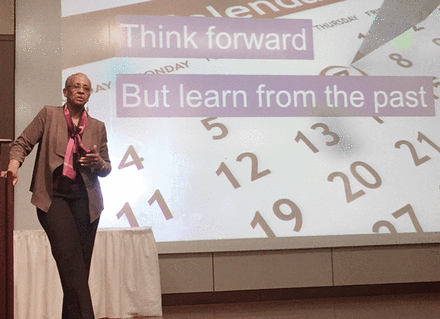
APHA President Shiriki Kumanyika speaks at an event in Richmond, Virginia.
The Texas A&M Health Science Center School of Public Health in College Station, Texas, observed National Public Health Week with a number of activities on its campuses in College Station and McAllen, Texas. The week kicked off with guided tours of walking trails, during which promotional materials and door prizes were given out. Local officials also presented the school with a proclamation declaring NPHW in the Brazos Valley, followed by a panel offering career advice to public health students. The School of Public Health’s Health and Wellness Committee hosted an outdoor yoga class for students and faculty. On Wednesday of NPHW, the Texas Department of State Health Services hosted a presentation on a salmonella investigation at a restaurant, which included lessons learned and details on how such investigations are handled. A blood drive was held in partnership with the American Red Cross, students were invited to use a driving simulator to experience the results of texting while driving, and winners of a student research poster competition were announced.
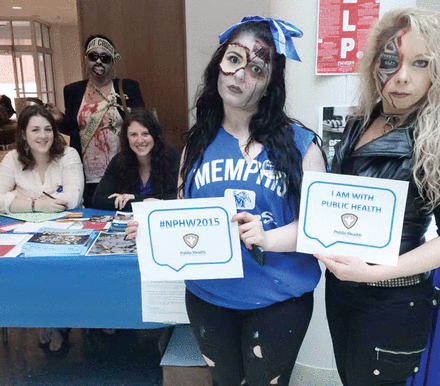
University of Memphis School of Public Health students in Memphis, Tennessee, host a zombie preparedness event.
The Brazos Valley Obesity Prevention Network conducted sessions on obesity prevention and public health strategies to promote healthy eating and physical activity. The school also held a reception to honor a representative of the International Atomic Energy Agency. Throughout NPHW, students were encouraged to take photos illustrating environmentally friendly behaviors and enter the photos into an Instagram contest. Texas A&M University also took part in the Million Mile Month challenge, a global challenge to communities to complete 1 million miles of physical activity in one month.
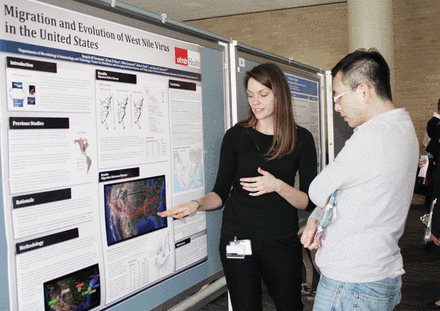
University of Texas Medical Branch in Galveston, Texas, holds a symposium featuring presentations from faculty and students.
On the McAllen campus, NPHW activities included a month-long walking initiative, an exhibit on health issues within communities along the Texas-Mexico border, and a panel discussion on the Affordable Care Act. Also in McAllen, U.S. Rep. Rubén Hinojosa, D-Texas, attended the signing of an agreement with South Texas College that will facilitate students’ ability to pursue a bachelor’s degree in public health at Texas A&M.
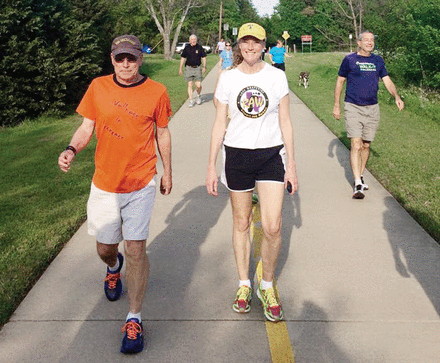
The Lake Grapevine Runners and Walkers in Grapevine, Texas, host a walking event to celebrate National Public Health Week.
In observance of National Public Health Week, Students for Public Health at the University of Texas at El Paso in El Paso, Texas, distributed male and female condoms on campus and offered information about free HIV testing. Students for Public Health also spent the week gathering signatures for APHA’s Healthiest Nation pledge.
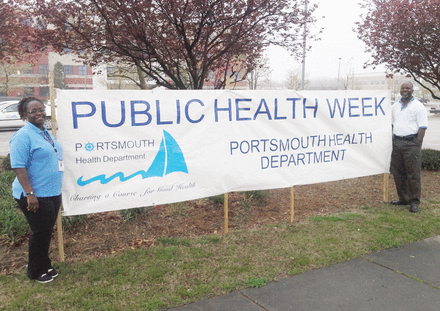
The Portsmouth Health Department in Portsmouth, Virginia, shows off its spirit for National Public Health Week.
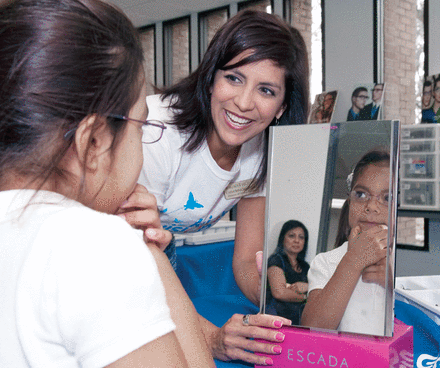
The Kids Vision for Life-Greater Houston Coalition in Houston, Texas, delivers eyeglasses to students in need.
Tarrant County Public Health in Fort Worth, Texas, observed National Public Health Week by raising awareness of the role of public health in the community. Public health director Vinny Taneja, MBBS, MPH, an APHA member, met with local commissioners to discuss the county’s health status and to highlight three of the agency’s efforts: a tobacco cessation program, a healthy nutrition initiative and a program that supports small businesses in creating employee wellness activities. Taneja also highlighted the department’s work to engage community members through social media. Tarrant County Public Health also received an official proclamation acknowledging Public Health Week from a local commissioner.
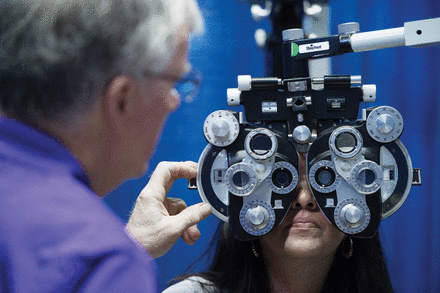
A woman receives an eye exam during a free health and dental clinic held by Your Best Pathway to Health in San Antonio.
San Antonio photo courtesy James Bokovoy
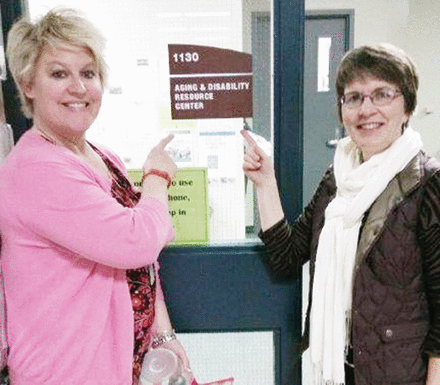
Eau Claire City-County Health Department in Eau Claire, Wisconsin, holds a scavenger hunt for department employees.
The University of North Texas Health Science Center School of Public Health students in Fort Worth, Texas, celebrated National Public Health Week with a Creative Health Innovations Contest, shared their favorite healthy foods and regional dishes at a cultural potluck event, and took part in the Victory Over Violence Walk/Run sponsored by the Women’s Center of Tarrant County. The contest featured ideas for positive public health change, with the winning entry an idea for a “safe move” bracelet, which would help law enforcement agencies track and rescue victims of sex trafficking. NPHW activities also included a networking event and public health awards ceremony. The week’s keynote address recognized the 20th anniversary of NPHW and discussed ways to support the NPHW theme of “Healthiest Nation 2030.”
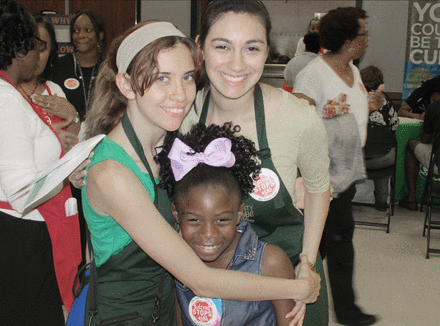
Waco, Texas, residents participate in a healthy soul food cooking demonstration to celebrate National Public Health Week.
The Department of Preventive Medicine and Community Health at the University of Texas Medical Branch in Galveston, Texas, celebrated National Public Health Week with its Fifth Annual Public Health Symposium. A keynote address focused on the state of children’s well-being in Texas and discussed policies that can help children reach their full potential. The symposium also featured 35 posters from students and faculty highlighting research that impacts public health. More than 80 faculty, students, staff and community members attended the event.

The University of Washington Tobacco Action Group and University of Washington students host Huskies Kick Butts Day.
University of Washington photo courtesy Julie Van Tosh Photography
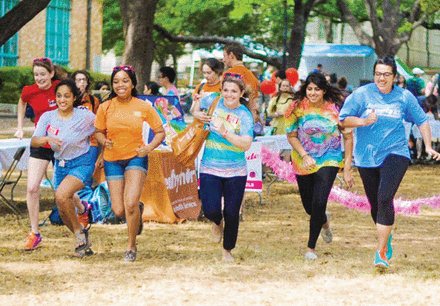
University of Texas at Austin students get active to celebrate National Public Health Week.
The Lake Grapevine Runners and Walkers in Grapevine, Texas, hosted a walking event to celebrate National Public Health Week. Members of the exercise group were encouraged to invite a friend, family member, co-worker or neighbor who does not usually walk or run for fitness purposes. Dozens of people, including children on bikes and scooters, participated in the hour-long event, which was followed with healthy refreshments and a raffle.
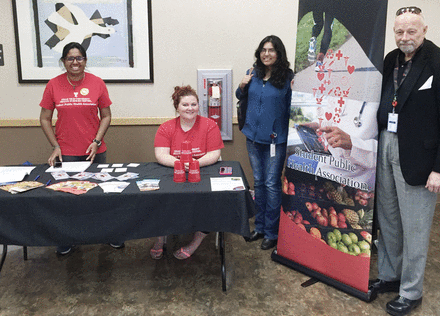
Texas Tech University Health Sciences Center students share details about their public health program in Lubbock, Texas.
In Harlingen, Texas, the University of Texas Health Science Center-San Antonio Regional Academic Health Center recognized National Public Health Week with Celebrate Public Health T-shirts and walks around the campus grounds. Following the talk, Leonel Vela, MD, MPH, founding dean of the Regional Academic Health Center, gave a presentation to more than 60 attendees on the importance of public health awareness.
The Kids Vision for Life-Greater Houston Coalition in Houston, Texas, which works to improve access to care for children with unresolved vision problems, observed National Public Health Week with an event to deliver eyeglasses to students in need. In all, more than 1,600 pairs of glasses were delivered to Houston-area schools.
In conjunction with National Public Health Week, the University of Houston College of Optometry in Houston, Texas, announced the formation of a new APHA Vision Care Section interest group. The student chapter is a first of its kind at a college of optometry and will work to promote the prevention and early detection of ocular issues and diseases and the importance of regular eye health care.
Texas Tech University Health Sciences Center in Lubbock, Texas, hosted its first events in celebration of National Public Health Week. Among its many events, the Student Public Health Association organized an informational table about vaccines, sexually transmitted diseases and the school’s new Master of Public Health degree program, which began last year. A global health lecture series focused on community health educators, also known as promotoras. The week’s biggest event was a public screening of the documentary “The Waiting Room,” which chronicles events in the emergency room of a public hospital.
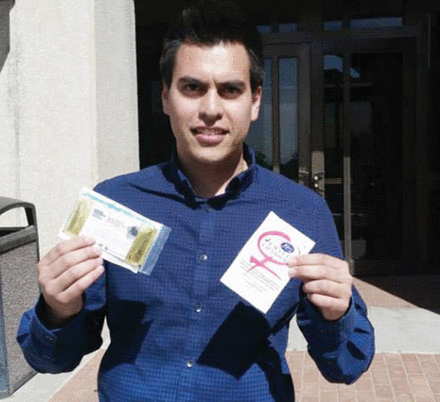
Students for Public Health at the University of Texas at El Paso distribute sexual health information on campus.
The Texas Department of State Health Services — Health Service Region 1 in Lubbock, Texas, kicked off National Public Health Week with an employee appreciation breakfast. Throughout the week, staff organized informational displays, educational materials and giveaways. Daily emails were sent out to staff highlighting each of the five NPHW daily themes. Staff were invited to a discussion about health equity with the regional representative of the state Center for Elimination of Disproportionality and Disparities. To conclude the week, staff participated in the South Plains Coalition for Child Abuse Prevention’s “Go Blue” campaign to raise awareness about child abuse.
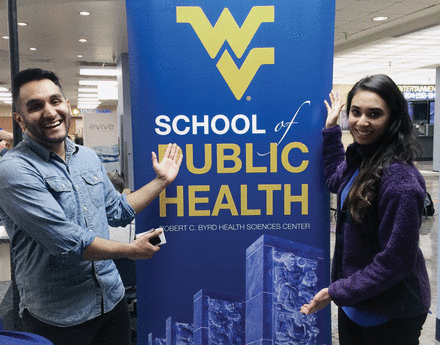
West Virginia University students in Morgantown, West Virginia, give information about the School of Public Health.
More than 6,000 residents of San Antonio, Texas, received free medical and dental services during National Public Health Week, courtesy of Your Best Pathway to Health, a service of Adventist-Laymen’s Services and Industries that organizes free medical, vision and dental events in venues around the country and world. The event, which was co-sponsored by the San Antonio Metropolitan Health District, provided more than $20 million in free health services to uninsured and underinsured residents. On-site services included primary care visits, women’s health services, immunizations, root canals, teeth extractions, eyeglass fittings, sexually transmitted disease screenings, physical therapy, free meals and much more.
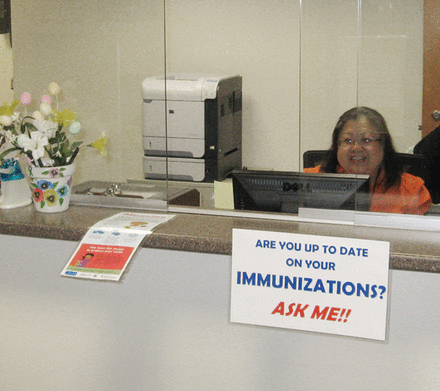
Public health staff in Portage County, Wisconsin, inform residents about available services.
In San Antonio, Texas, tuberculosis staff at the San Antonio Metropolitan Health District and the Heartland National Tuberculosis Center came together to celebrate National Public Health Week and honor those on the front lines of caring for people with tuberculosis and controlling the spread of the disease.
In Stephenville, Texas, public health students at Tarleton State University Department of Medical Laboratory Sciences and Public Health celebrated National Public Health Week with posters that illustrated the consequences of sugar consumption and tobacco smoke. Students measured the content of sugary drinks and displayed the sugar in plastic bags. Visitors were also encouraged to breathe through a straw to simulate the breathing difficulties of those living with chronic obstructive pulmonary disease. Students also attended a lecture on control and prevention of tuberculosis in the U.S.
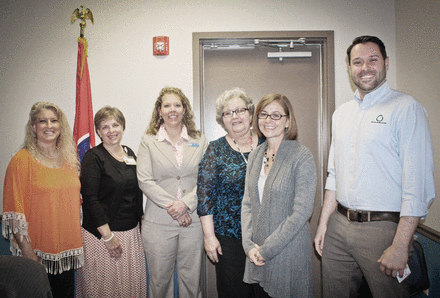
Health workers in Clinton, Tennessee, complete a seminar about the health of babies who are born drug-dependent.
A Healthy Soul Food Cooking Demonstration and Health Fair was the focus of a National Public Health Week event in Waco, Texas. Sponsored by the Baylor University Office of Community Engagement and Service, the Waco-McLennan County Public Health District and the Waco Alumnae Chapter of Delta Sigma Theta Sorority Inc., the fair featured soul food tastings, jump rope, hula hoop and dancing. Attendees learned about choosing healthier food options and heart healthy assessments, could take advantage of blood pressure checks, blood glucose screenings and HIV testing, and could sign up to be a bone marrow donor. Of the more than 200 people who attended the fair, more than 35 percent took part in HIV testing, blood pressure and blood glucose checks, and had their body mass index measured.
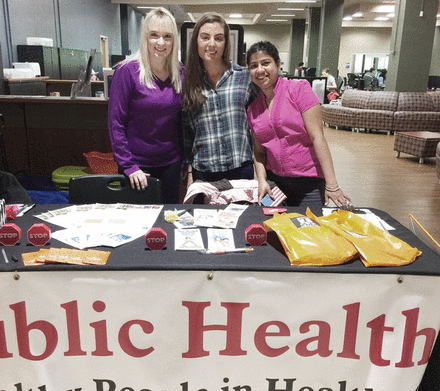
University of Tennessee public health students pass out treat bags filled with healthy snacks, stress relievers and fact sheets.
VIRGINIA
The George Mason University Center for Climate Change Communication in Fairfax, Virginia, highlighted climate change research during National Public Health Week. APHA member Mona Sarfaty, MD, MPH, director of the Program for Climate and Health at the George Mason center, led efforts to survey thousands of pulmonary, thoracic, allergy and immunology physicians nationwide on the effects of climate change on their patients. The results, which found that three out of four physicians surveyed indicated that climate change is already impacting their patients’ health, were presented at the Climate for Health National Leadership Convening in April.
Staff at Fort Belvoir Community Hospital in Fort Belvoir, Virginia, set up informational displays at the hospital in observance of National Public Health Week. The displays, which were set up in a high-traffic area of the hospital, addressed topics such as public health nursing, environmental health and industrial hygiene.
Master of Public Health students in the joint program at Eastern Virginia Medical School and Old Dominion University in Norfolk, Virginia, hosted a variety of events to celebrate National Public Health Week. Among the activities was a networking event featuring more than 20 local public health organizations and a panel of public health professionals. More than 100 students, staff and community members took part in the event. Students traveled to the rural community of Franklin, Virginia, to volunteer at a local food bank, helping to distribute hundreds of pounds of food. Students also volunteered with a local faith-based outreach center to make sack lunches for homeless residents. At a nearby military community, students participated in an event promoting public health education, wellness, nutrition management and environmental projects. Students partnered with a local elementary school and educated sixth-graders on healthy nutrition, oral health care, sleep health and personal hygiene. Other NPHW events included a Zumba-thon to promote physical activity and participation in a five-kilometer race to raise funds for pancreatic cancer.
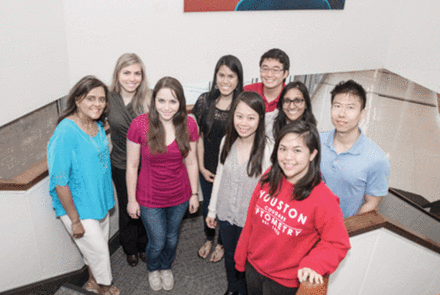
A Vision Care Section interest group began at University of Houston College of Optometry.
In Richmond, Virginia, Master of Public Health students at Virginia Commonwealth University partnered with the Richmond City Health District to create a This is Public Health RVA social media campaign in recognition of National Public Health Week. The campaign included a video to raise awareness about the role of public health in community well-being and featured health district staff and students highlighting various public health work as well as residents talking about their knowledge of public health. The video also invited residents to participate in a photo contest and upload images of what public health means to them. As of April, the video had been viewed more than 600 times. In conjunction with the video, health district staff led a This is Public Health sticker campaign in downtown Richmond. The university’s Public Health Student Association also sponsored a screening of the film “The Anonymous People,” which chronicles the experiences of people in recovery from alcohol and drug addiction. Students also organized a keynote address featuring APHA President Shiriki Kumanyika, PhD, MPH, who spoke on creating the healthiest nation by 2030.
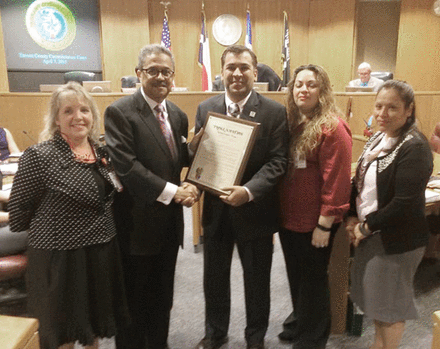
Tarrant County Public Health receives a National Public Health Week proclamation in Fort Worth, Texas.
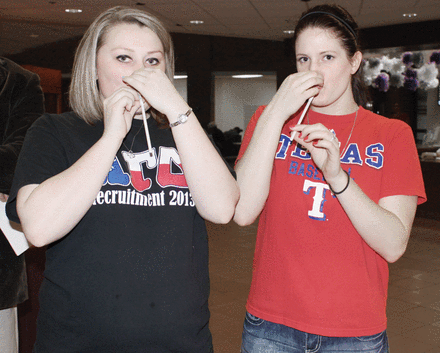
Tarleton State University students use straws to simulate breathing of people with lung disease in Stephenville, Texas.
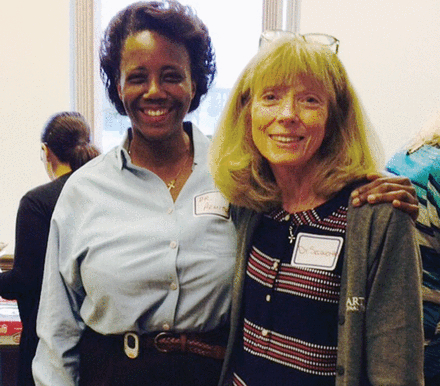
Public health workers in San Antonio recognized efforts to contain tuberculosis.
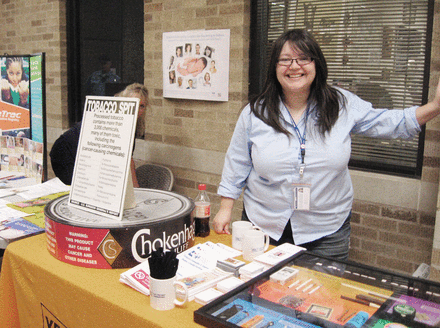
The Texas Department of State Health Services hosts a public health fair in Lubbock, Texas, with displays and giveaways.
WASHINGTON
Students at Lake Washington Girls Middle School in Seattle, Washington, addressed the topic of public health during the school’s annual Science Fair, which was held during National Public Health Week. Seventh-grade students presented a variety of public health-related science projects, including presentations on flu vaccine effectiveness, bacterial growth on school surfaces, pneumonia among people who are homeless and pesticides in foods. Judges hailed from Public Health — Seattle and King County, the University of Washington School of Public Health, the University of Washington-Tacoma Nursing Program and Delta Dental. Judges provided students with feedback and offered ways the young researchers could get more involved in public health.
In Seattle, Washington, the University of Washington Tobacco Action Group, in collaboration with the Associated Students of the University of Washington Student Health Consortium, hosted Huskies Kick Butts Day in observance of National Public Health Week. More than 50 people participated in the event to pick up cigarette butts around campus, collecting nearly 8,000 butts between two afternoon shifts. Each participant received an event T-shirt, refreshments and was entered into a drawing for a $25 gift card. In addition, Tobacco Talk, a campus tobacco cessation program, offered free quit kits.
WEST VIRGINIA
The Student Association of Public Health at West Virginia University in Morgantown, West Virginia, observed National Public Health Week with a variety of activities. Students distributed facts on campus and online about the health status of West Virginians, gave out information about the university’s School of Public Health and provided resources to promote community collaborations. Beyond the university campus, students organized a prom for residents of a local nursing home, participated in a local health fair, and cooked dinner for guests at the Rosenbaum Family House, which provides a place for patients and their families to stay while receiving care at West Virginia University medical facilities. Students also participated in the Relay for Life, a cancer fundraising event, and volunteered at a kids’ health fair.
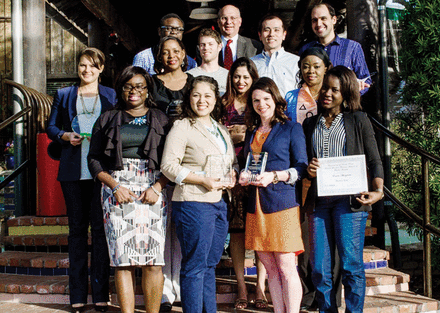
University of North Texas Health Science Center students receive awards for public health leadership and innovation.
WISCONSIN
To celebrate National Public Health Week, the Eau Claire City-County Health Department in Eau Claire, Wisconsin, created a scavenger hunt for health department employees. Staff were given clues about organizations and public agencies that the health department partners with and were challenged to locate and take photos of the organizations, all of which were located within walking distance of the health department. The scavenger hunt was designed, in part, to encourage physical activity. The answers were then shared at a staff meeting, which also featured a trivia game using the five daily NPHW themes. Participants were entered into a drawing to win prizes.
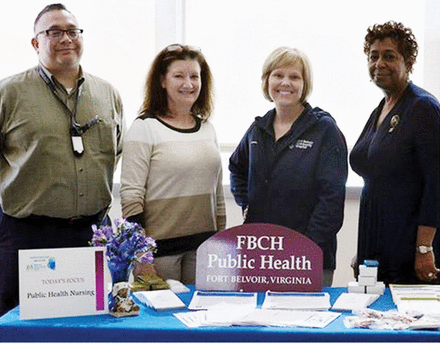
Staff at Fort Belvoir Community Hospital in Fort Belvoir, Virginia, set up informational displays in public areas.
Portage County Health and Human Services Department’s Division of Public Health in Stevens Point, Wisconsin, celebrated National Public Health Week with an official proclamation declaring NPHW in Portage County. Public Health Division staff invited hundreds of community partners to attend an open house, where visitors could tour the remodeled health services clinic, meet public health practitioners, and learn about available public health services and programs. Visitors were also given T-shirts and reusable water bottles. Staff additionally used social media to encourage residents and colleagues to sign APHA’s pledge to help create the healthiest nation in one generation.
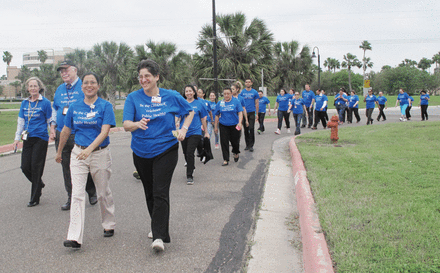
The University of Texas Health Science Center at San Antonio’s Regional Academic Health Center holds a campus walk.
Editor’s note: This article was updated post-publication
North Dakota students highlight American Indian health for NPHW
Public health students at North Dakota State University in Fargo, North Dakota, organized to raise awareness of local and global public health issues during this year’s National Public Health Week celebration.
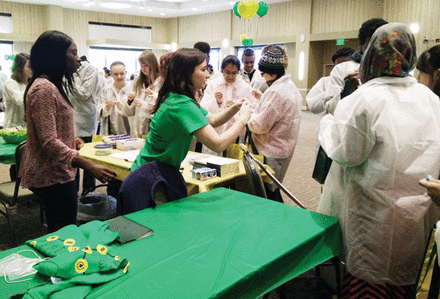
North Dakota State University students host high schoolers in an infectious disease discovery event during NPHW.
The university’s Student Public Health Association partnered with city officials to host a Walk This Way event on the university campus.
On the Wednesday of NPHW, a panel of speakers gathered to discuss public health careers and opportunities. NPHW activities also explored infectious disease with a disease detective event. High school students and undergraduates participated in a mock investigation to find “patient zero.” The event was designed to highlight the importance of vaccinations and herd immunity, proper infection control and disease screening.
Master of Public Health students at the university took NPHW as an opportunity to spread the word about the new MPH program and educate fellow students on the role of public health in people’s lives.
Students organized a one- or two-mile walk for students and community members on campus, hosted a networking event where people could explore public health careers, set up a community and global partnership informational booth as well as a booth about American Indian and minority health.
The last day of NPHW featured an informational booth organized to bring attention to global health issues and highlighted students’ experiences working abroad as well as the importance of community global health partnerships.
Also during the final day of NPHW, students worked to raise awareness of the state of American Indian and minority health in North Dakota. Students set up an informational booth that provided information on health inequities.
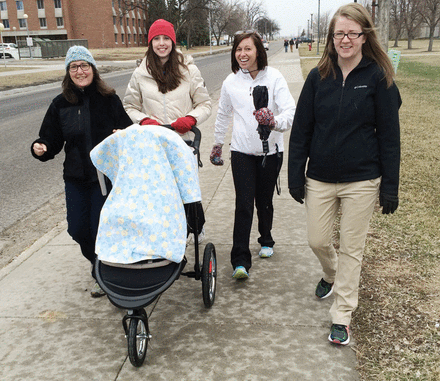
Students and community members enjoy a one- or two-mile walk around campus as part of NPHW events.
The booth also highlighted the work of the university’s American Indian Public Health Resource Center, which is part of the Master of Public Health program, as well as the opportunity of MPH students to specialize in American Indian public health.
Florida A&M features minority health issues during NPHW
Minority health issues took center stage during National Public Health Week observances at the Institute of Public Health at Florida A&M University in Tallahassee, Florida.
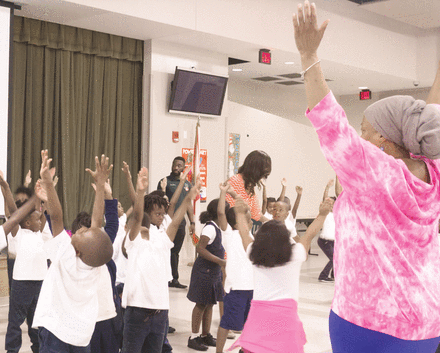
Children learn about being healthy at a Florida A&M University NPHW event.
To announce the week’s activities, visitors to the health campus were greeted by a banner commemorating NPHW, while more than a dozen students handed out fliers about upcoming events, packets of health information and healthy snacks.
On Tuesday of NPHW, students sponsored a health fair for a local elementary school and taught children about choosing healthy snacks and staying physically active after school. The following day, public health students at the historically black university organized a healthy nutrition and Zumba class.
The week’s signature event was the institute’s annual community town hall, which this year had a theme of “Black Lives Matter: Building Broader Connections” and focused on challenges facing minority populations. Event speakers included representatives from the Tallahassee City Commission, the chief of the university’s campus police, a local expert on food security issues and speakers on mental health and HIV/AIDS.
This year marked the 20th anniversary of NPHW as well as the 20th anniversary of the Institute of Public Health, which celebrated with a public health promotion party. To mark the anniversary, students gathered in the main student union on campus and handed out healthy snacks, information about the institute, and displayed posters and pictures of the institute’s accomplishments during the past two decades.
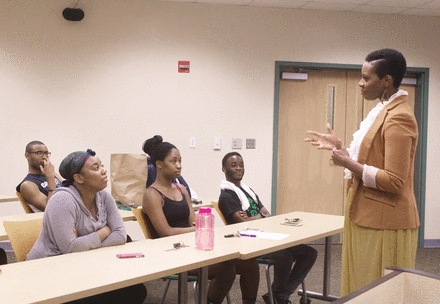
A full week of NPHW events at Florida A&M University included a school health fair, town hall meeting and more.
Students rally behind NPHW at University at Buffalo in New York
The University at Buffalo’s School of Public Health and Health Professions in Buffalo, New York, celebrated National Public Health Week with a wealth of educational opportunities and conversations about the state of public health.
“Our school hosted a number of exciting events that not only highlighted various areas of public health, but also the breadth of our school,” said APHA member Jean Wactawski-Wende, PhD, dean of the School of Public Health and Health Professions.
Among its many NPHW activities, the school hosted its annual Saxon Graham Lecture featuring Tim Byers, MD, MPH, an associate dean and professor at the Colorado School of Public Health, who spoke on the intersections between nutrition and cancer. Students also hosted a community health promotion fair at the Community Health Center of Buffalo, offering information on nutrition, fire prevention, caregiver assistance and other topics.
More than 150 people attended the school’s second Western New York Refugee Health Summit on April 9, which focused on building pathways toward culturally engaged health care for refugees. Attendees gathered to discuss ways to overcome the main obstacles to care that refugees often face, such as language barriers, and brainstormed short- and long-term goals toward improved health. Attendees also had the opportunity to review an online platform being developed to facilitate the sharing and coordination of refugee health resources.
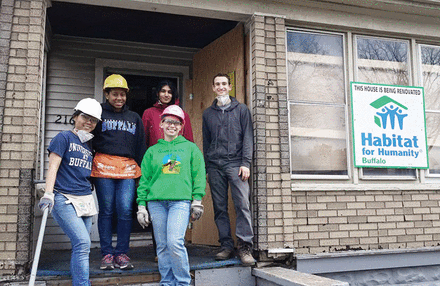
Epidemiology and environmental health graduate students at the University at Buffalo volunteer at a Habitat for Humanity site for NPHW.
Also during NPHW at the University at Buffalo, Brian King PhD, MPH, senior scientific advisor in the Office on Smoking and Health at the Centers for Disease Control and Prevention, and APHA member Cheryl Healton, DrPH, MPA, dean of global public health and director of the Global Institute of Public Health at New York University, spoke at the Fifth Annual Global Health Day, which also included a panel discussion on the prevention of noncommunicable diseases.
The university’s Epidemiology and Environmental Health Graduate Student Association celebrated NPHW as well, with a public health leadership workshop, which featured conversations on creative problem-solving, decision-making and employee motivation. Members of the graduate student association also volunteered with Habitat for Humanity and hosted a documentary screening.
Also at the University at Buffalo and in observance of NPHW, Pi Theta Epsilon, an honor society for occupational therapy, hosted a screening of the documentary, “Alive Inside,” which explores the effects of music on patients with dementia. A panel discussion followed the viewing. Buffalo Mayor Byron Brown presented a proclamation declaring April as Occupational Therapy Month in Buffalo during the event.
Portsmouth, Virginia, health workers host NPHW
The Portsmouth Health Department in Portsmouth, Virginia, celebrated National Public Health Week with five days full of activities that reached hundreds of residents.
In support of Monday’s NPHW theme of “Raising the Grade,” Portsmouth health workers organized a day of healthy food choices, featuring items such as hummus, cucumber water and kale chips, and invited health and social services employees to have a bite and learn about nutrition. On Tuesday and in conjunction with the NPHW theme of “Starting from ZIP,” the health department hosted a certified application counselor from a local community health center who hosted a table in the health department’s lobby and offered assistance with and information about the Affordable Care Act and the health insurance marketplace, and a ZIP code matching game designed to raise awareness about health disparities.
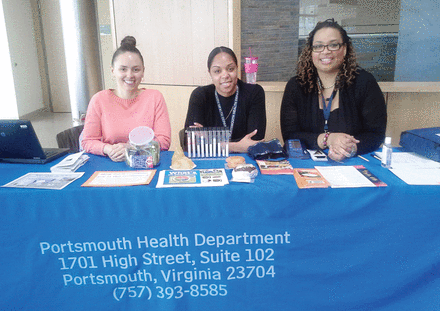
Portsmouth, Virginia, health department workers hosted a week of events in celebration of National Public Health Week.
In line with Wednesday’s NPHW theme of “Building Momentum,” health workers visited a local community college to offer free blood pressure screenings as well as an interactive trivia game about public health. A highlight of the event was strapping participants into a 40-pound “weight suit.” Participants were asked to do exercises while in the weight suit so they could experience the effects of extra weight.
To highlight Thursday’s NPHW theme of “Building Broader Connections,” health department staff partnered with a local grocery store chain, which was promoting its own healthy living and weight loss campaign. Health staff, along with local Portsmouth officials, went on a tour of the grocery store and learned healthier shopping tips. NPHW events in Portsmouth culminated on Friday with a display about the health department’s accomplishments. In keeping with the NPHW daily theme of “Building on 20 Years of Success,” the health department hosted free blood pressure screenings and healthy cooking demonstrations and distributed health literature from community-based health organizations.
Drexel public health students celebrate event-packed National Public Health Week
Public health students at Drexel University in Philadelphia, Pennsylvania, organized a variety of fun and interactive ways to engage their fellow students in learning about public health during National Public Health Week.
The Student Government Organization of the Drexel University School of Public Health kicked off the first day of NPHW with a number of activities, including a scavenger hunt that placed public health quizzes at various checkpoints around campus. Also on Monday of NPHW, students hosted a screening of “A Place at the Table,” a documentary about hunger in America, followed by a panel discussion that included one of the mothers featured in the film. Public health students also gave out milk and cookies along with breastfeeding information that highlighted Drexel’s on-campus lactation room. In addition, the School of Public Health hosted a display table with information about Monday’s NPHW theme of “Raising the Grade.”
On Tuesday and in line with the NPHW daily theme of “Starting from ZIP,” students created a wheel with ZIP codes that visitors could spin to learn about health disparities in the Philadelphia area. At the same table, visitors could also sign up to take part in an environmental cleanup event. Also on Tuesday, public health students met with local high school students in an underprivileged Philadelphia community to discuss ways to prepare for college and how to pay for higher education. Wednesday featured a series of speakers who discussed issues such as global public health, gun violence and strategies for preventing gun-related deaths. Among the speakers was Nan Feyler, JD, MPH, deputy health commissioner at the Philadelphia Department of Public Health, who spoke about public health as an agent of change.
Thursday activities focused on the NPHW theme of “Building Broader Connections” and offered an APHA 101 workshop, which encouraged students to join the Association and take advantage of volunteer opportunities. On Friday, Drexel public health students organized free HIV testing. Students also hosted Pretzels with Police, which gave students the chance to talk about safety with university police and emergency medical services staff. Visitors to the Pretzels with Police table could also pick up information about maternal and child health and make their own stress balls with balloons and flour.
Also in observance of NPHW, 30 students and professionals in public health, nursing, medicine, music therapy and business gathered at the Drexel University College of Nursing and Health Professions Center for Interdisciplinary Clinical Simulation and Practice to work in small teams and tackle complex health-related problems. With a goal of developing students’ capacity for interprofessional collaboration, each team was given a clinical or nonclinical scenario and had to work together to solve the problem.
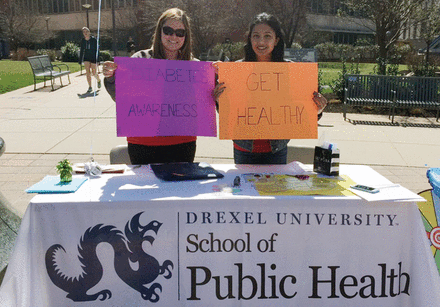
Drexel University School of Public Health students hosted a week of NPHW events, including tables that raised awareness about disparities in health.
For example, in one clinical scenario, the team finds two patients in a trauma bay: a victim of a stabbing in stable condition who is accompanied by his wife and gunshot victim in critical condition who is accompanied by a police officer. The team had to figure out how to treat both patients simultaneously, even after learning that the gunshot patient had perpetrated the stabbing. Nonclinical scenarios involved laws and ethics, business interests and the health insurance system. For example, one scenario involved the case of two married men, one who is severely injured while the couple is visiting a state that does not recognize same-sex marriage. The situation leads to discrepancies as to who is in charge of making medical decisions for the injured patient.
Following the simulation activity, participants and facilitators shared their reflections on the experience and headed to a networking reception.
Houston students share research, learn advocacy
Learning effective advocacy skills was among the many National Public Health Week events at the University of Texas Health Science Center at Houston’s School of Public Health in Houston, Texas.
To kick off the week, the school’s Student Association partnered with Student Health Services to offer student health risk assessments. Registered nurses and dietitians were on hand to provide blood pressure checks, blood glucose checks, nutrition counseling and health advice. The event was designed to support Monday’s NPHW theme of “Raising the Grade” by providing accessible preventive health services to students. On the second day of NPHW and in support of the daily theme of “Starting from ZIP,” public health students worked to highlight the accomplishments of the public health discipline as well as faculty researchers.
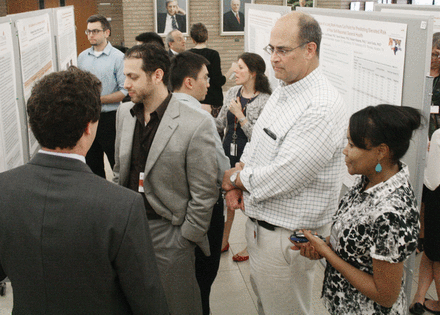
During a National Public Health Week research day, University of Texas students share abstracts and posters.
To promote Wednesday’s theme of “Building Momentum,” the Student Association hosted an Advocacy Day and invited speakers to present on the legislative process, how to communicate effectively with lawmakers, how to promote a public health issue and to share their personal advocacy experiences. The goal of the event was to increase students’ knowledge of public health policy as well as offer basic advocacy skills.
Research Day took place on Thursday of NPHW and attracted participation from students attending fellow University of Texas campuses across the state. Nearly 40 students from San Antonio, Austin, Dallas and El Paso submitted abstracts and presented posters at the event. With the help of faculty judges, the top three presenters were awarded cash prizes. In line with the NPHW theme of “Building Broader Connections,” the Research Day connected students across universities and spread the word about public health research.
On the last day of NPHW and in conjunction with the day’s theme of “Building on 20 Years of Success,” students highlighted successes within the public health field. Also on Friday, members of the Student Association took new School of Public Health students as well as students who were deciding whether to pursue a master of public health degree on tours of the campus, offered advice on student life and hosted an evening social.
Delaware practitioners host NPHW events throughout state
The call to create the healthiest nation rang throughout the state of Delaware during National Public Health Week.
The Delaware Public Health Association in Newark, Delaware, embarked on a daily Facebook and Twitter campaign that offered information and quizzes connecting the daily NPHW themes to local public health work. The association also held a photo essay contest in which participants submitted public health images with the hashtag #ThisIsPublicHealthDE.
In a collaboration with the University of Delaware College of Health Sciences, the association served as an exhibitor at a Health and Wellness Expo. Association members engaged with more than 500 visitors and handed out a variety of promotional items.
Association president and chair of APHA’s International Health Section, Omar Khan, MD, MHS, co-organized a webinar on tobacco and substance abuse. Khan also visited the University of Puerto Rico Graduate School of Public Health to deliver a speech about global health.
In addition, the association also took part in an all-night Healthcare Hackathon at the University of Delaware, which challenged participants to develop creative ways to address health issues.
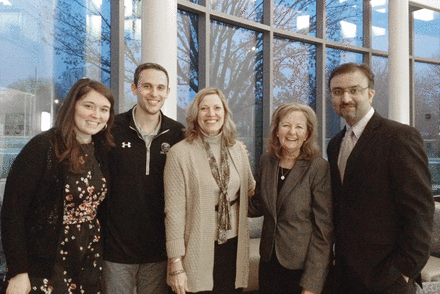
Public health leaders throughout the state of Delaware hosted many events for National Public Health Week.
At Delaware State University in Dover, Delaware, the Public and Allied Health Organization held a variety of events to raise awareness about careers in public health.
The organization set up an informational table and display on campus April 7–10. The first day focused on infectious diseases, the second on chronic diseases, the third on all-hazard preparedness, and the fourth day focused on environmental health and risk factors. Depending on the day, visitors could pick up brochures, free condoms or heart-shaped stress balls. Organizers also displayed messages from the This is Public Health campaign and streamed videos promoting public health awareness.
On the University of Delaware’s Science, Technology and Advanced Research Campus in Newark, Delaware, National Public Health Week was observed with the Indo-American Association of Delaware’s 17th annual Health and Wellness Expo. Co-hosted by the University of Delaware College of Health Sciences and the Blood Bank of Delmarva, the expo featured panel discussions, healthy foods and nutrition activities, opportunities to learn about research studies, a blood donation drive, and health screenings.
Marion, Ohio, joins with partners to improve community health
During National Public Health Week, public health workers in Marion, Ohio, celebrated the engagement of new community partners in their efforts to improve community heath.
Marion Public Health held an April 6 event with OhioHealth, a group of nonprofit, faith-based Ohio hospitals and health care organizations, as part of its community health assessment process. The groups engaged key local informants across multiple sectors to take part in shaping the health agency’s assessment process.
With the support of a local federally qualified health center and the local Board of Alcohol, Drug Addiction and Mental Health Services, the engagement of nontraditional partners is expected to enable new ways of addressing the social determinants of health and promoting health equity, according to organizers. Among the health agency’s non-traditional partners in the community assessment process are local school officials, businesses and organizations that address poverty.
The goal of bringing together a diverse mix of local stakeholders is to generate a preliminary list of potential health topics to address in the community. As of April, the list included perennial health issues such as tobacco use, obesity and substance abuse as well as nontraditional topics such as transportation, education, poverty, affordable housing, literacy and vulnerable populations, such as residents who are socially isolated, neglected, marginalized or who experience discrimination. In selecting health topics, the group of partners considered available local resources, assets, partnerships and political will that could positively support an intervention in light of potential barriers.
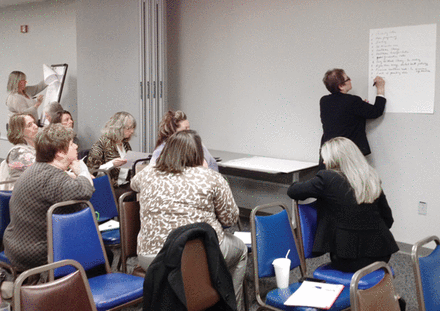
Marion Public Health holds a community improvement event.
The group of community stakeholders produced a list of 13 health topics, for which Marion Public Health and its partners produced a summary of local data, assets and barriers, which was presented during public sessions in May. The public sessions will inform a final selection of three to five topics that will serve as the focus of the health department’s community health improvement planning process.
West Allis Health Department launches social media
National Public Health Week marked a new addition to the world of social media — the West Allis Health Department of West Allis, Wisconsin.
During NPHW, the health agency launched its first Facebook page and Twitter account, @WestAllisHealth.
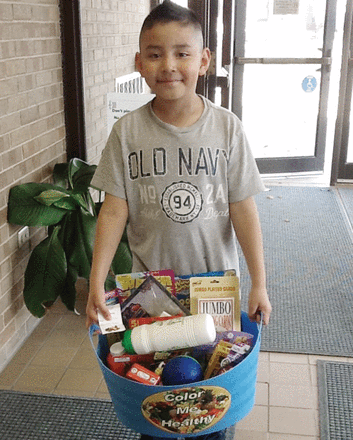
West Allis Health Department in Wisconsin offered a family activity basket for families to get more active together. The basket was offered as part of National Public Health Week.
Outside of the digital world, West Allis public health workers celebrated NPHW with a huge bulletin board depicting the role of public health in the larger community, which welcomed visitors as they entered the health department.
Health staff also set up an informational table display with giveaways such as vegetable seeds in the agency’s lobby.
The West Allis Health Department also marked NPHW with the release of its “This is Public Health!” video, a two-minute compilation of the work of public health. The video played in the waiting area of the health department’s clinic, along with videos about alcohol awareness, home-based asthma assessments, newborn programs and emergency preparedness.
Also during NPHW, the West Allis Health Department hosted a drawing for a family activity basket, which was filled with items such as balls, jump rope, a water bottle, sidewalk chalk, bubbles, a Frisbee and much more.
The basket drawing ties into the health department’s obesity initiatives and its efforts to promote physical activity.
Visit the West Allis Health Department’s new Facebook page online at bit.ly/WestAllisHealth.
McLean County, Illinois, attracts media attention with NPHW events
Community engagement was the common thread throughout the McLean County Health Department’s National Public Health Week events in Bloomington, Illinois.
Among the agency’s NPHW activities was a photo challenge for local seventh- and eighth-grade students.
Health workers encouraged the young students to think about ways to improve the health of McLean County and photograph examples of ways people can and do make a difference in the community’s health. Students submitted their photos to the health department, which then posted the photos on Facebook and asked visitors to vote for their favorites.
Health department workers were also invited to one of the schools with participating students. Health department leaders said they learned that one-on-one classroom interaction is the best way to engage young people in getting involved in public health.
Three local health and fitness facilities donated training packages to the top three winners, as chosen by a health department committee, and an award was given to the student whose photograph received the most “likes” on Facebook.
Also during NPHW, the health department invited women participating in the Special Supplemental Nutrition Program for Women, Infants and Children to share their best recipes using WIC food ingredients. Staff collected the recipes and shared them on the health department website.
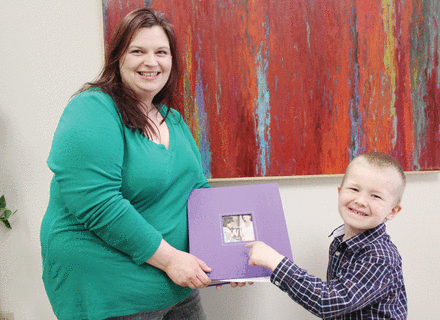
McLean County Health Department staff in Bloomington, Illinois, shared a new cookbook for residents during NPHW.
In addition, a recipe book was compiled and is now available. Health staff plan to continue collecting and sharing WIC recipes throughout the year.
On Thursday of NPHW, health workers visited the Illinois State University campus to record short videos of students responding to questions about how to make the U.S. the healthiest nation by 2030.
Health workers also provided students with health information. The project, which was covered by a local TV news station, captured the thoughts of more than 20 students, and a video compilation of the interviews will go up on the health department’s website.
To wrap up NPHW, the health department hosted Downtown Walk Around, which took place in downtown Bloomington and invited downtown business workers, city and county employees and the public to join a 20-minute lunchtime walk.
Bloomington Mayor Tari Renner as well as Chris Koos, the mayor of nearby Normal, Illinois, led the NPHW walk, which also garnered coverage in the local newspaper and on the local news station. Overall, more than 50 people took part in the Downtown Walk Around.
- Copyright The Nation’s Health, American Public Health Association


